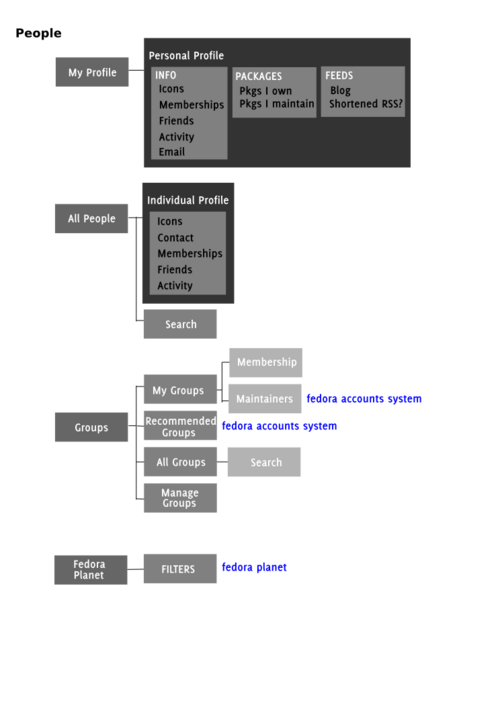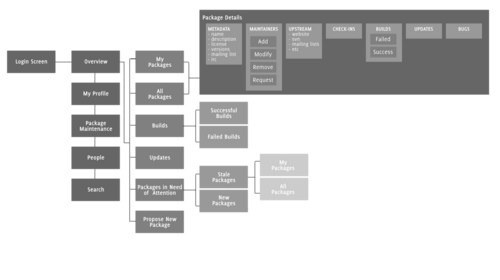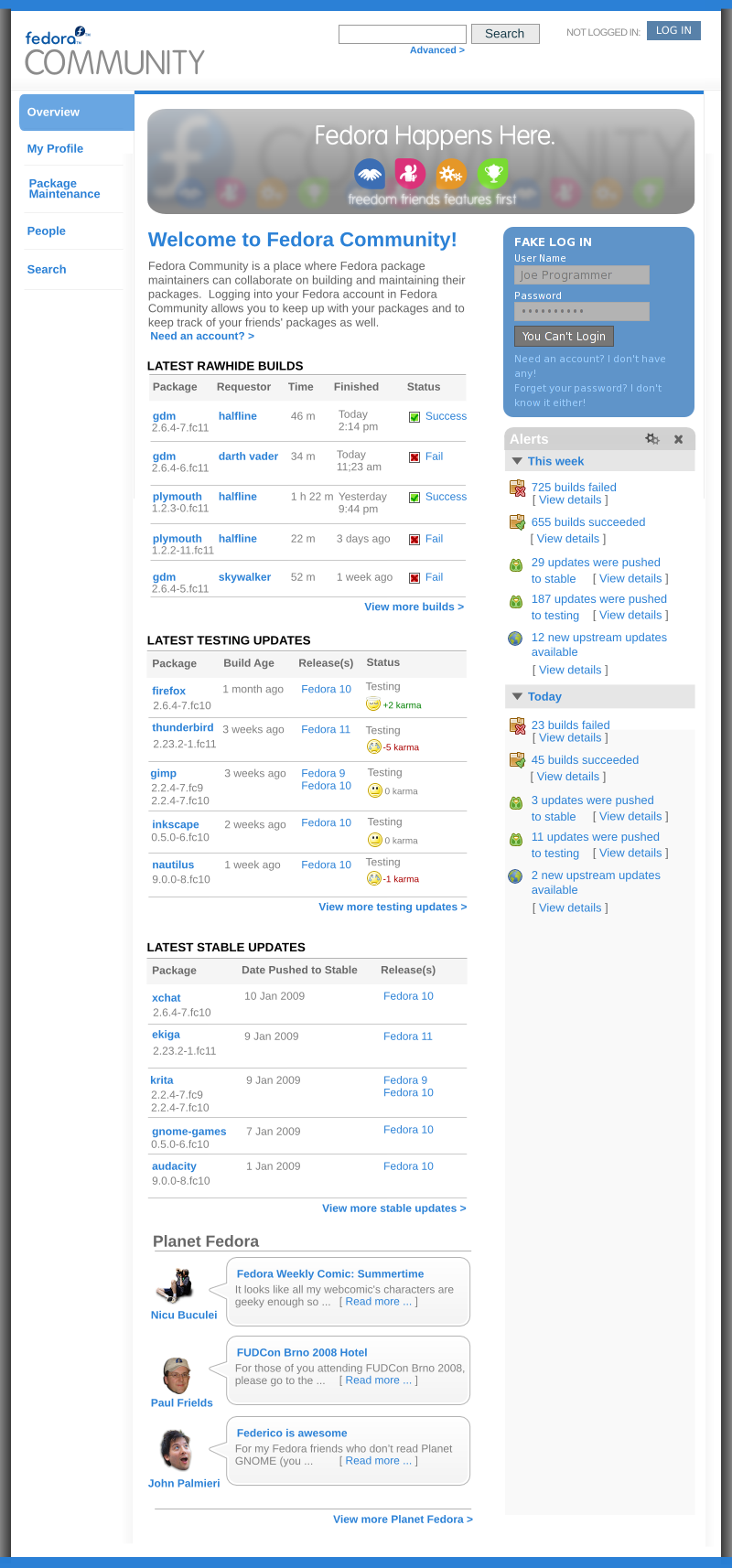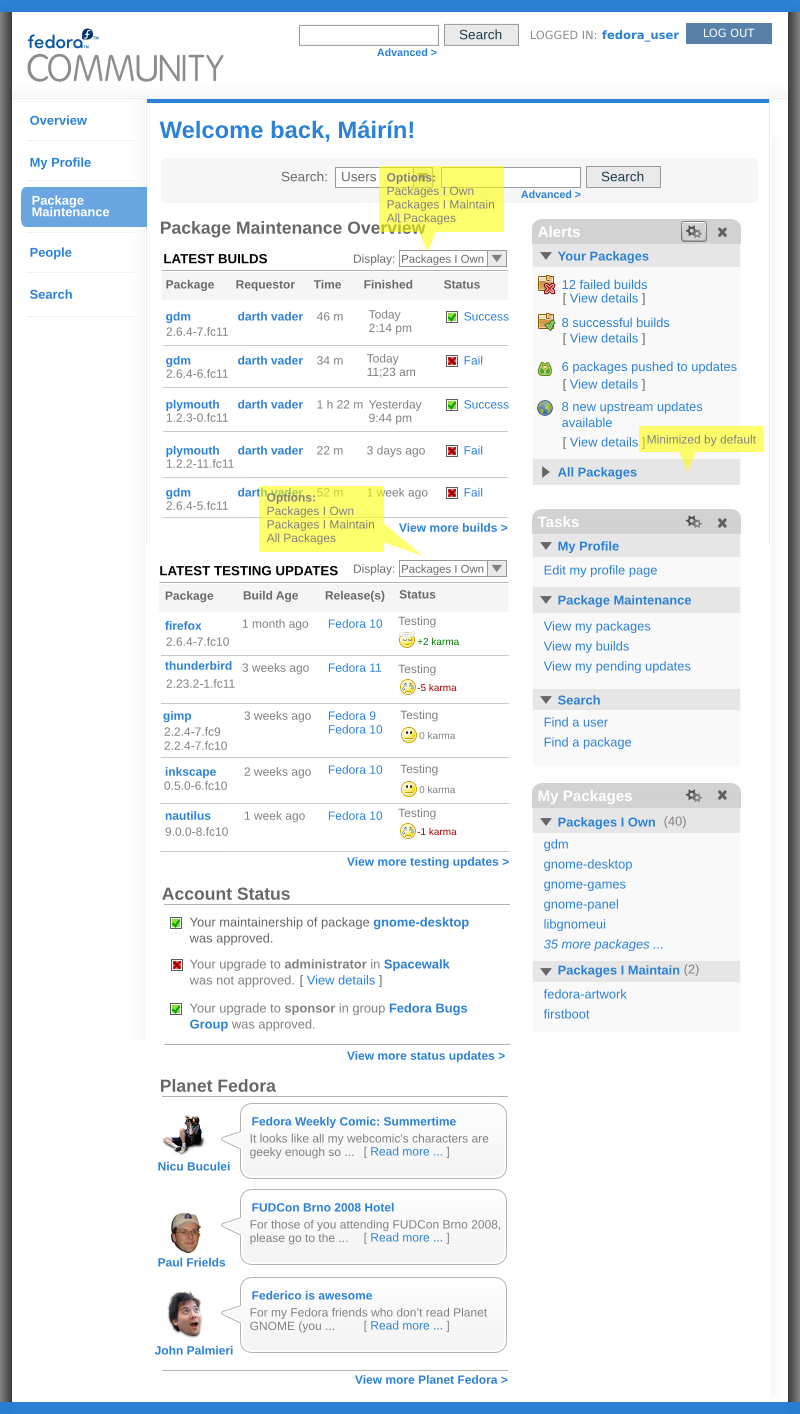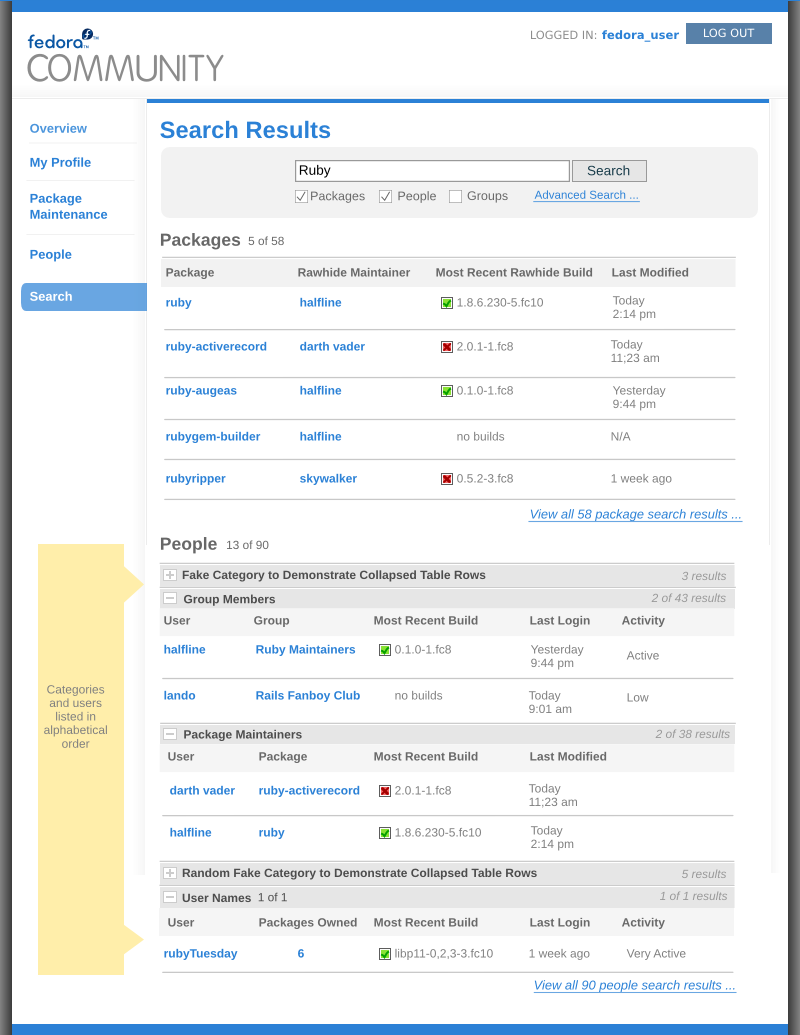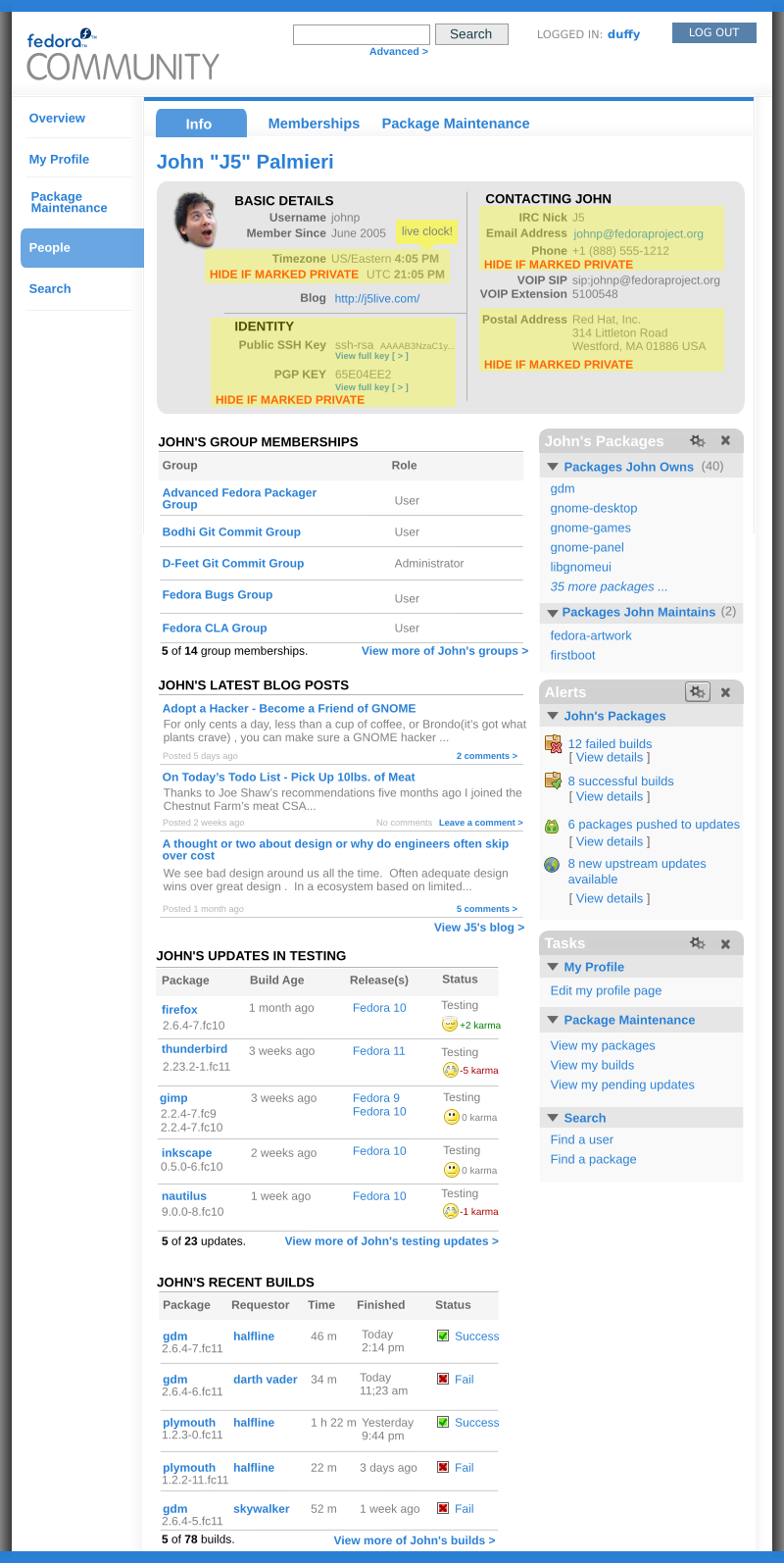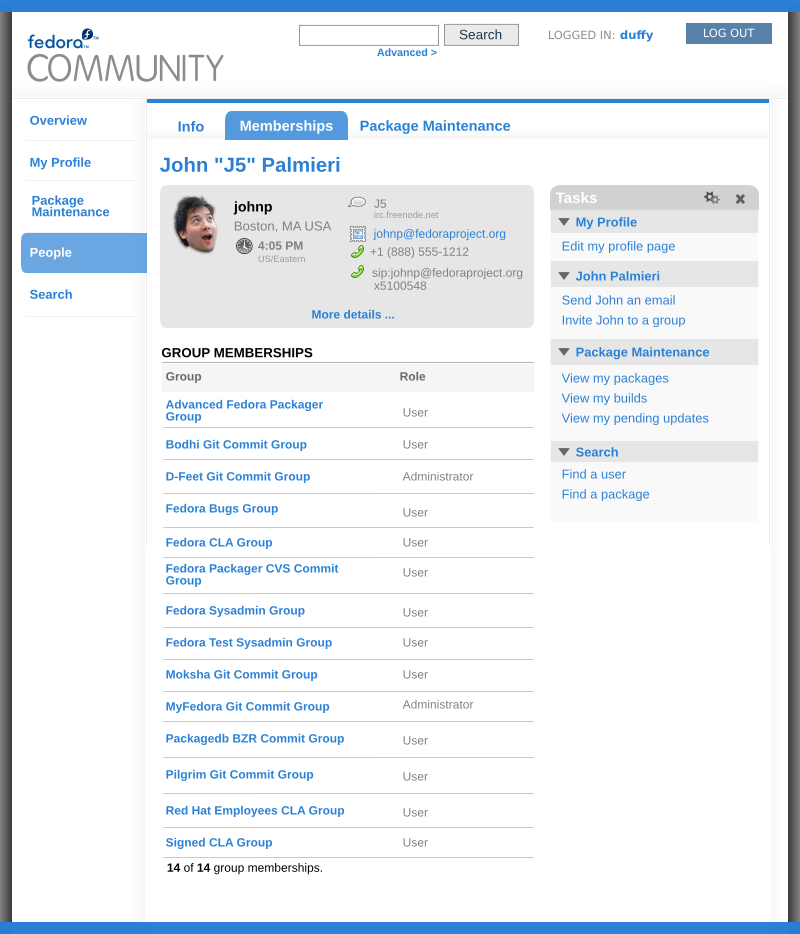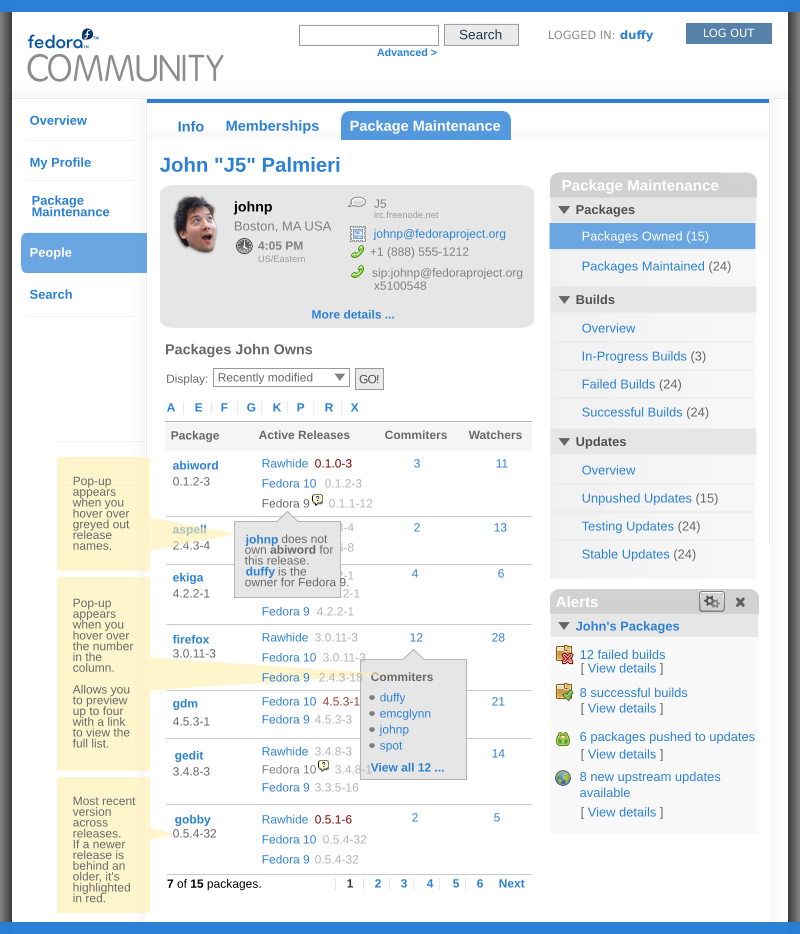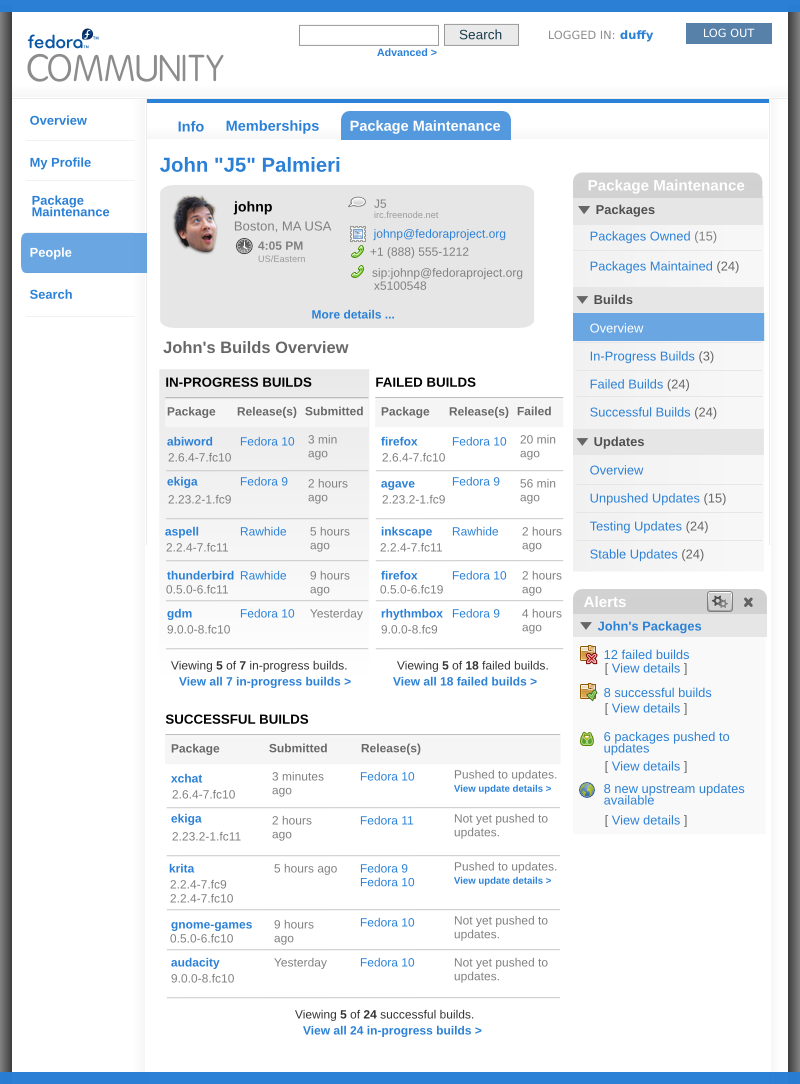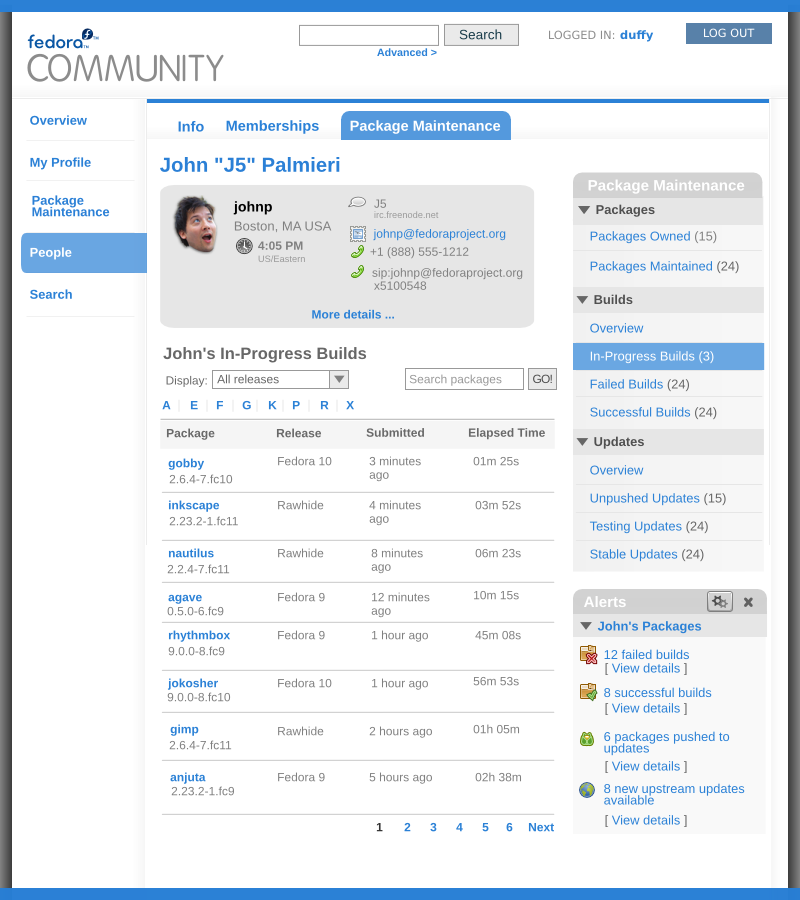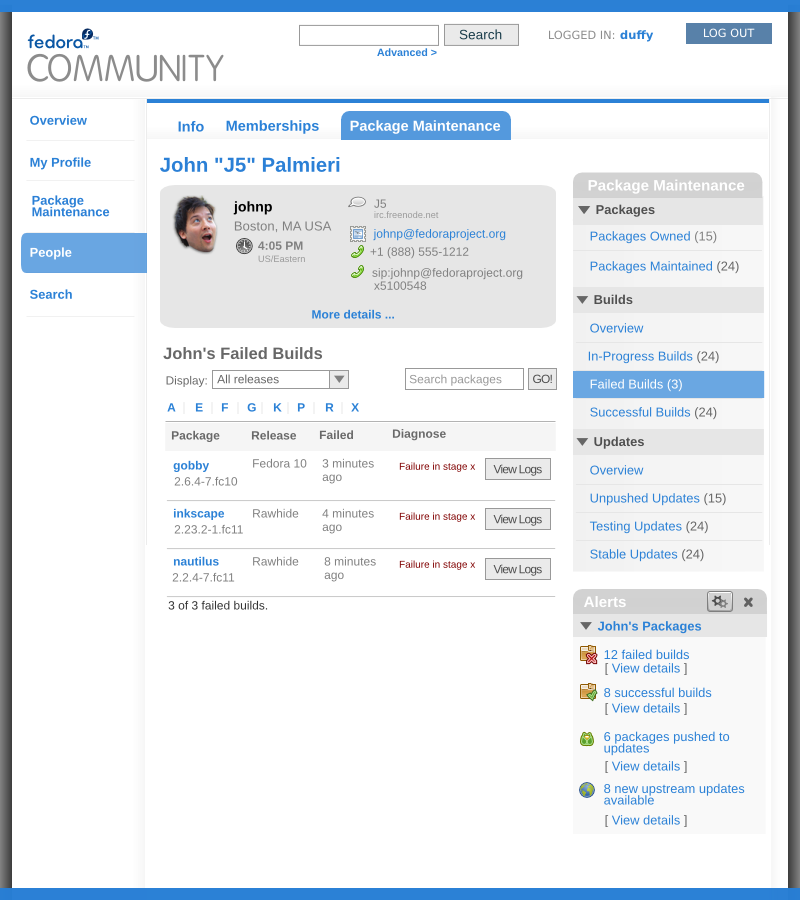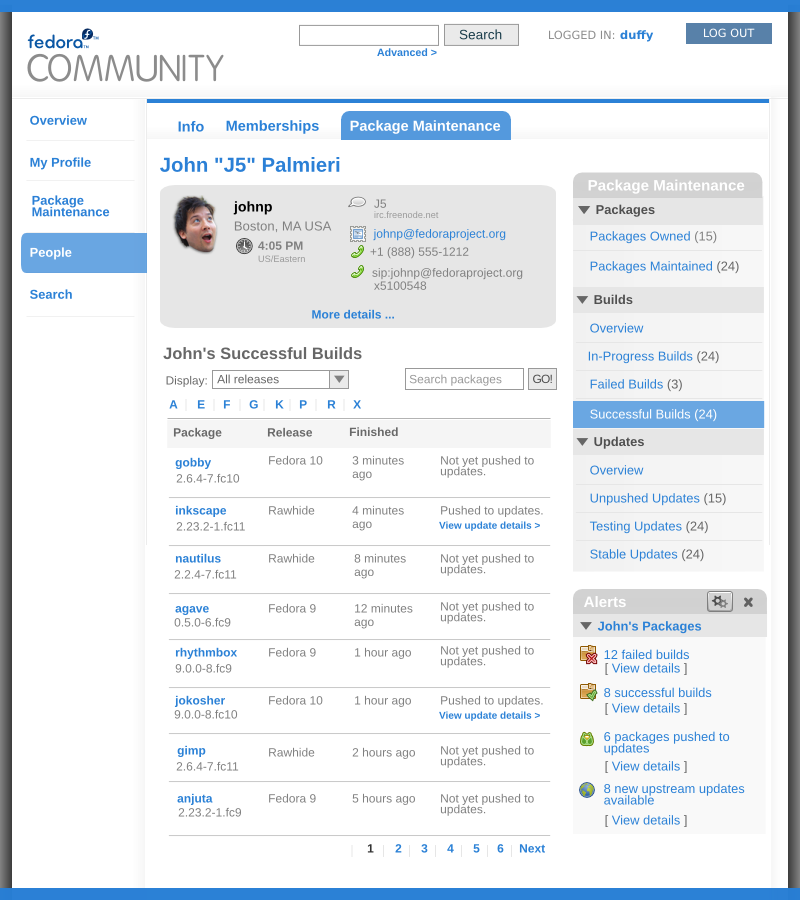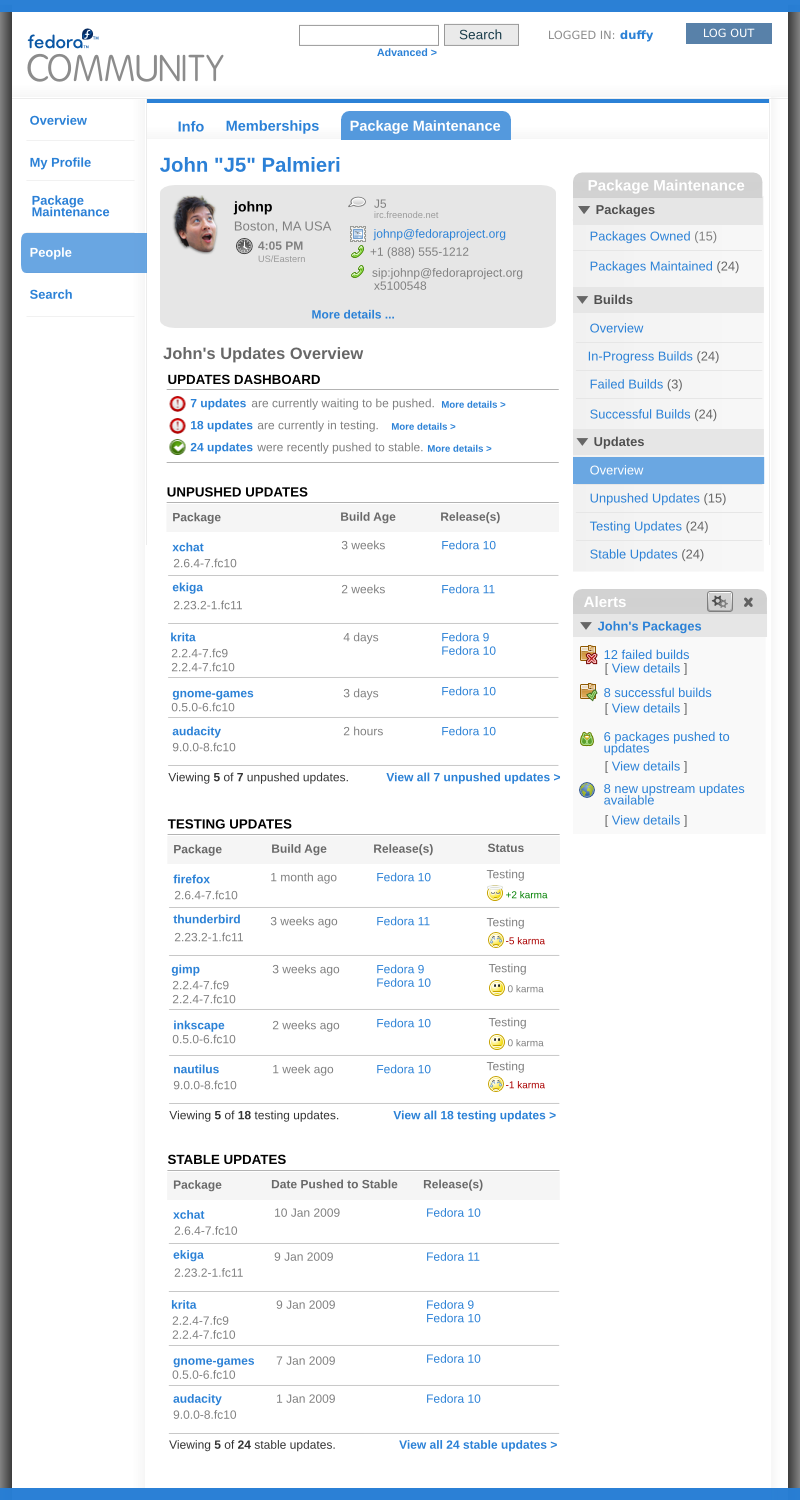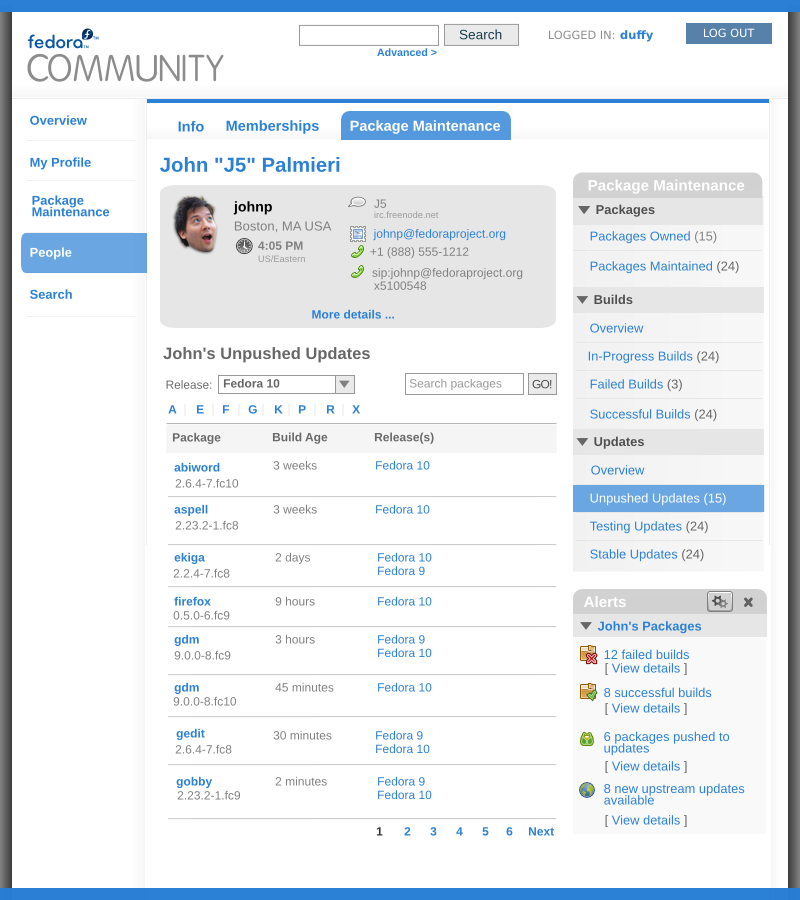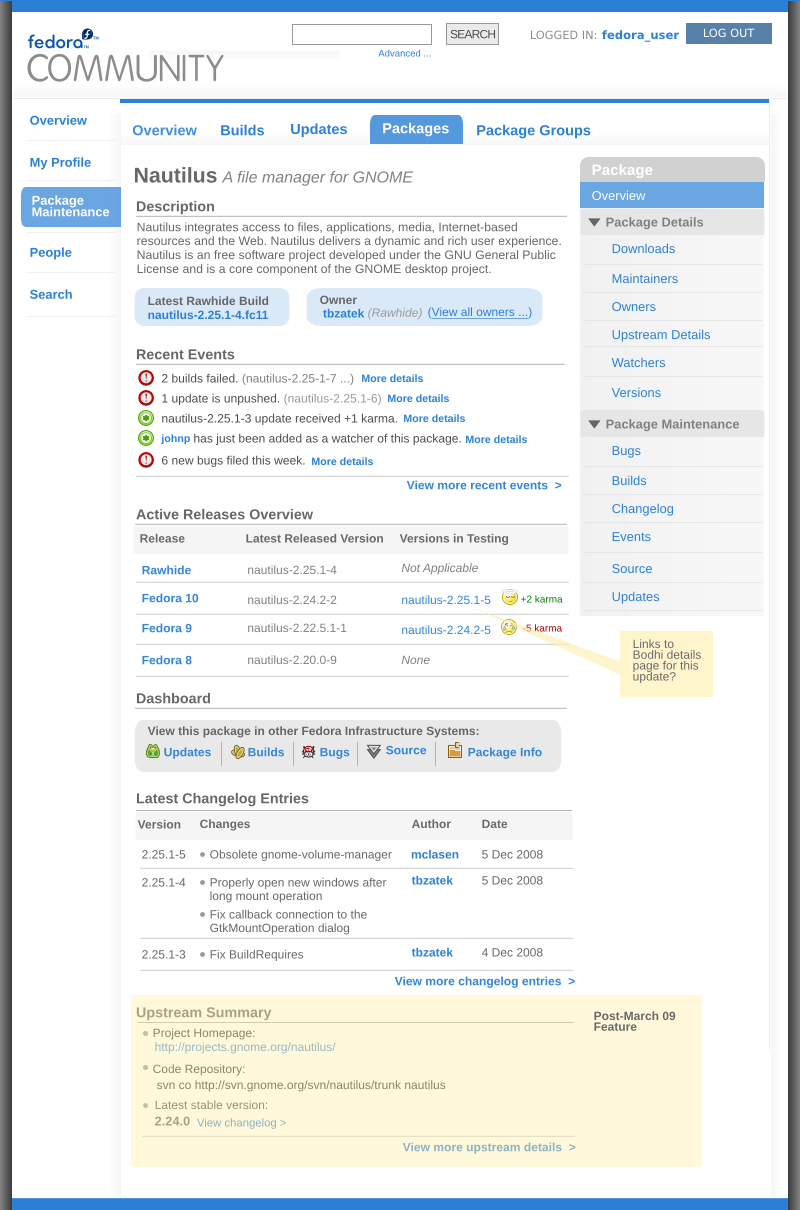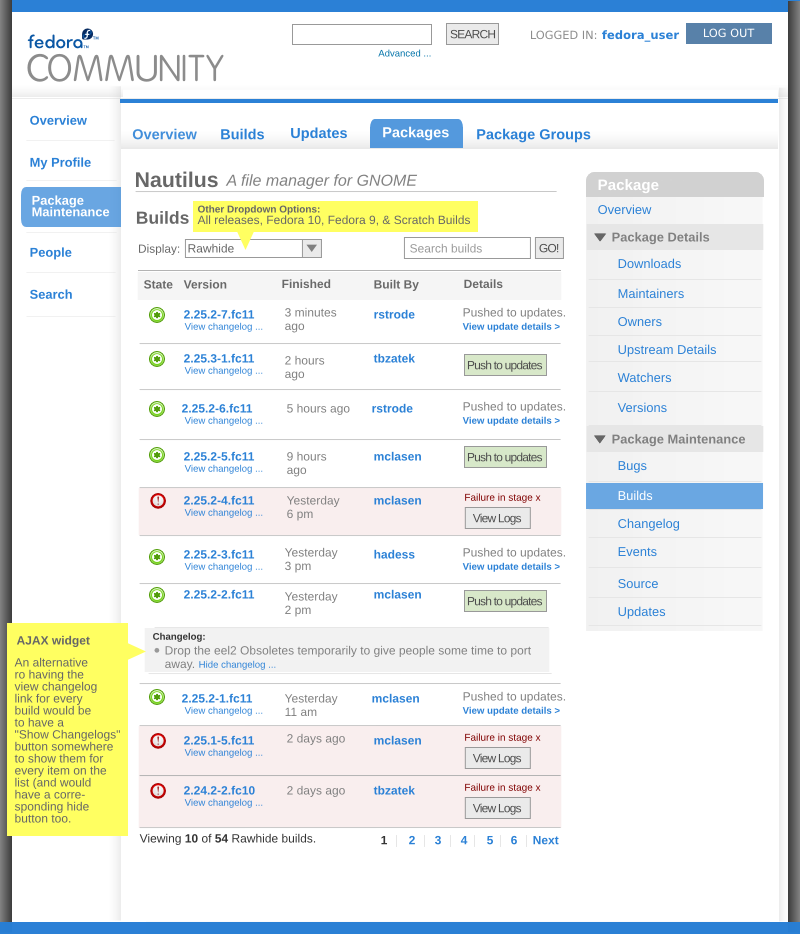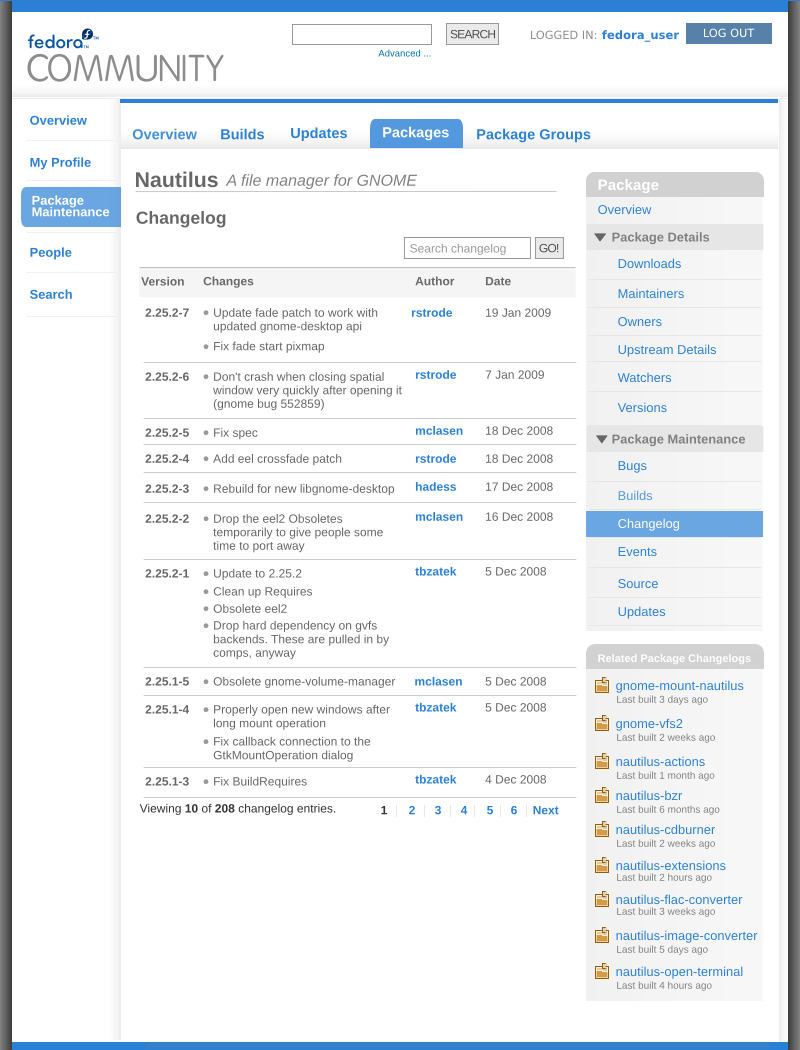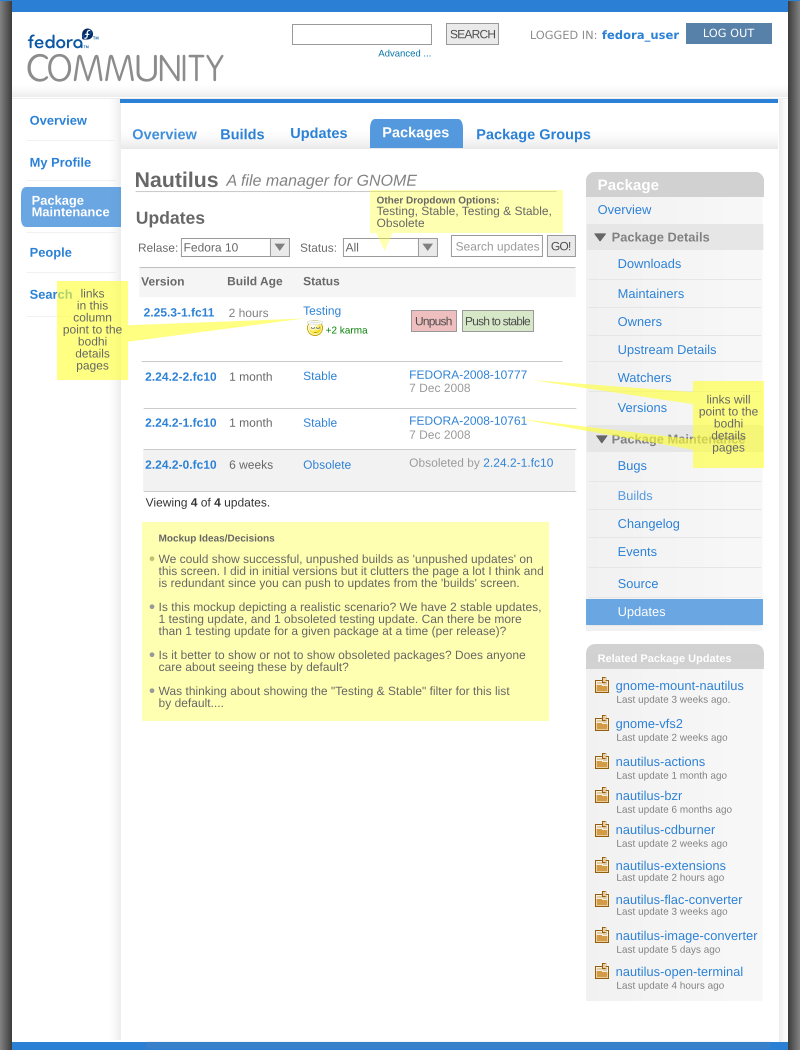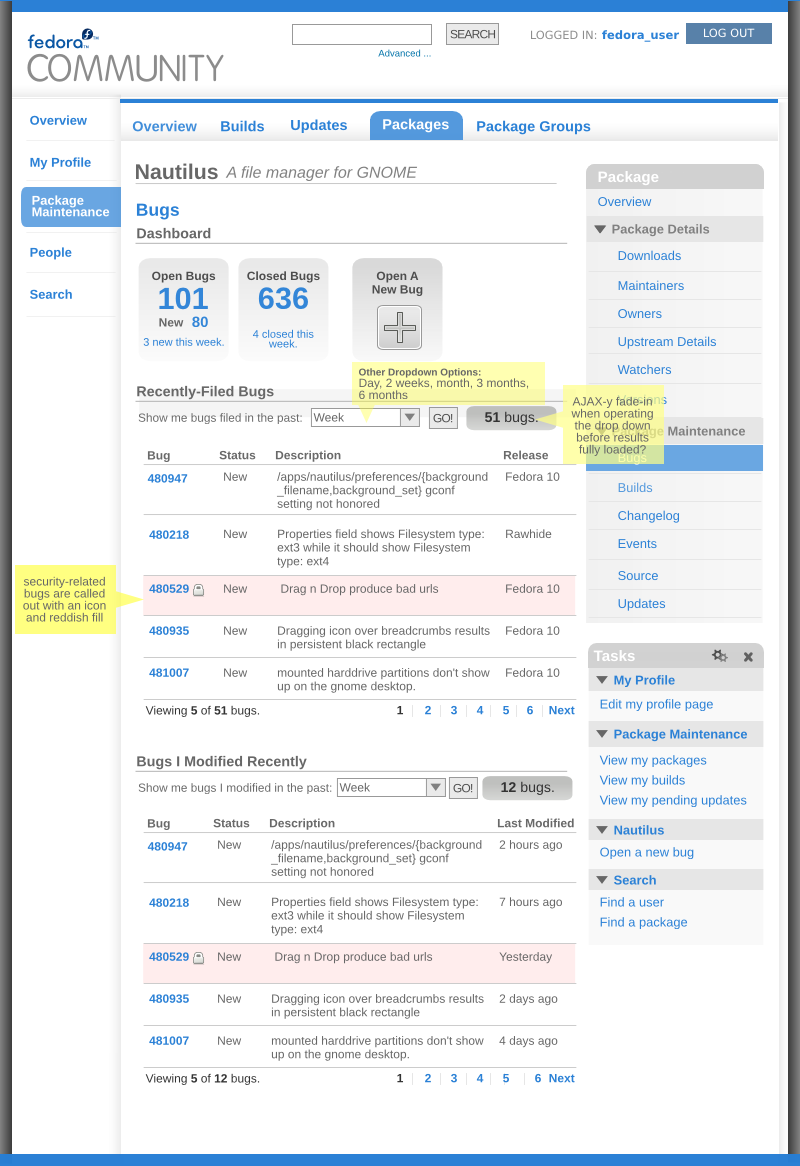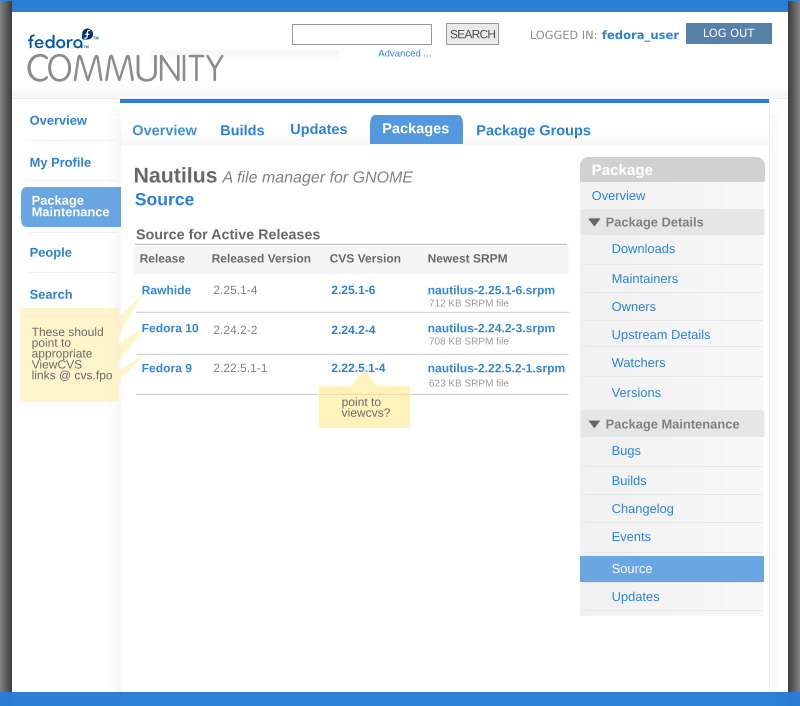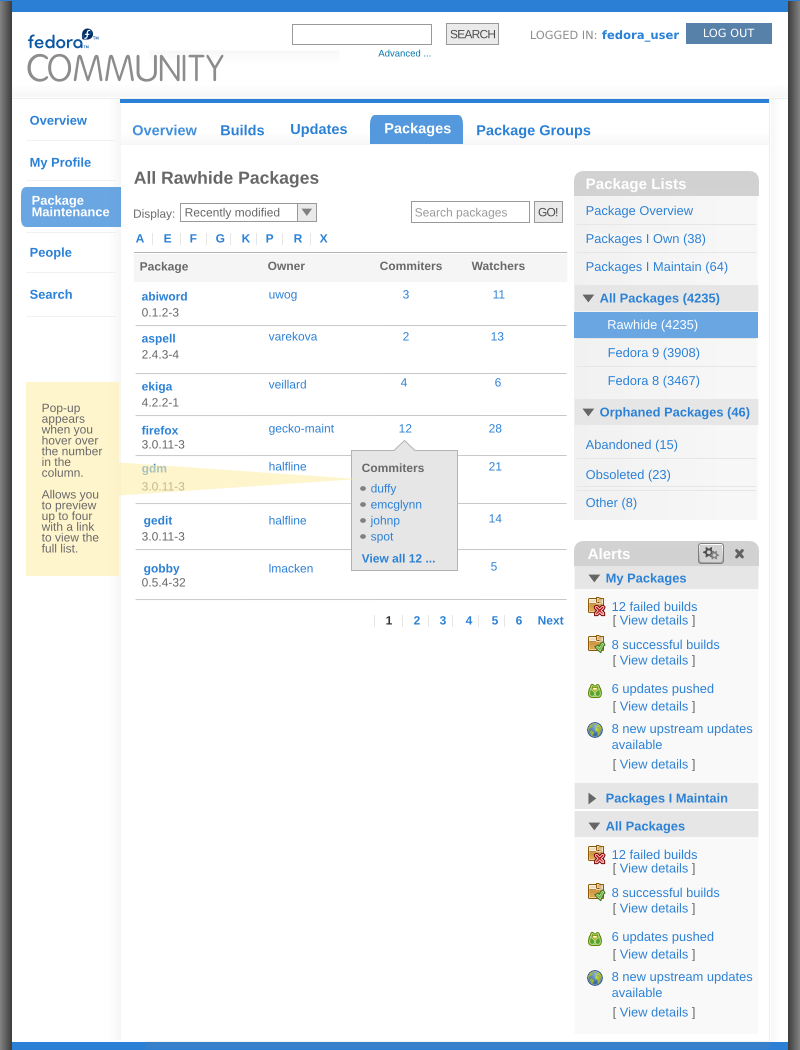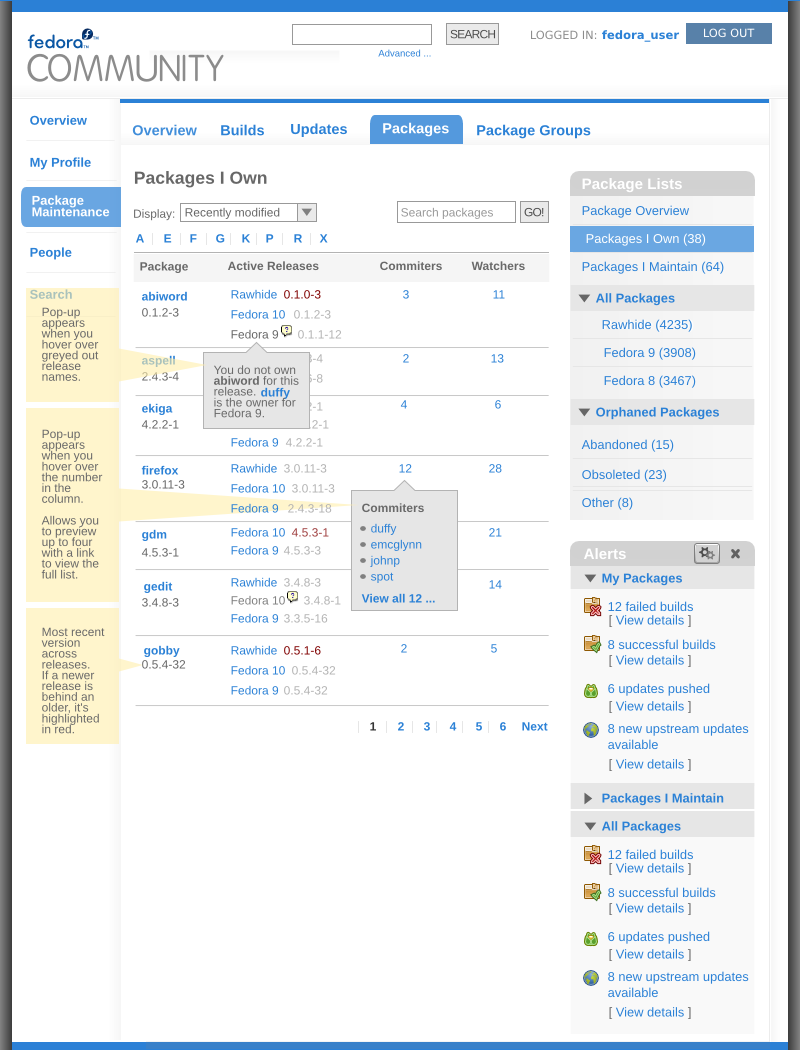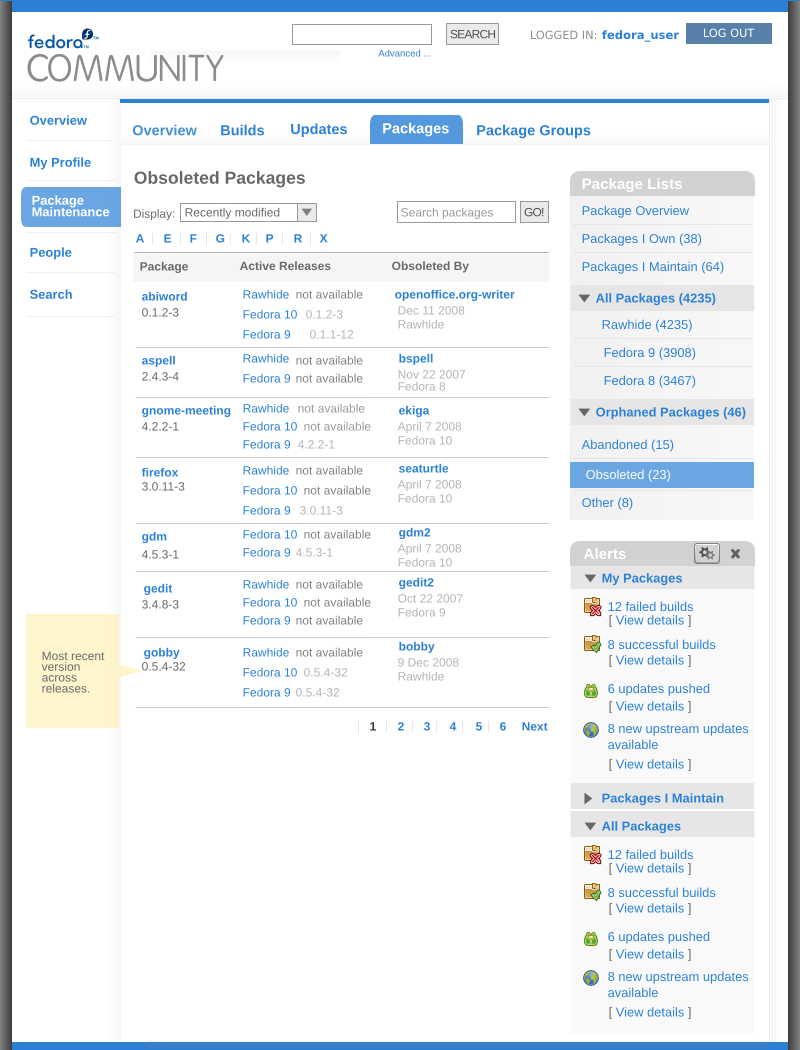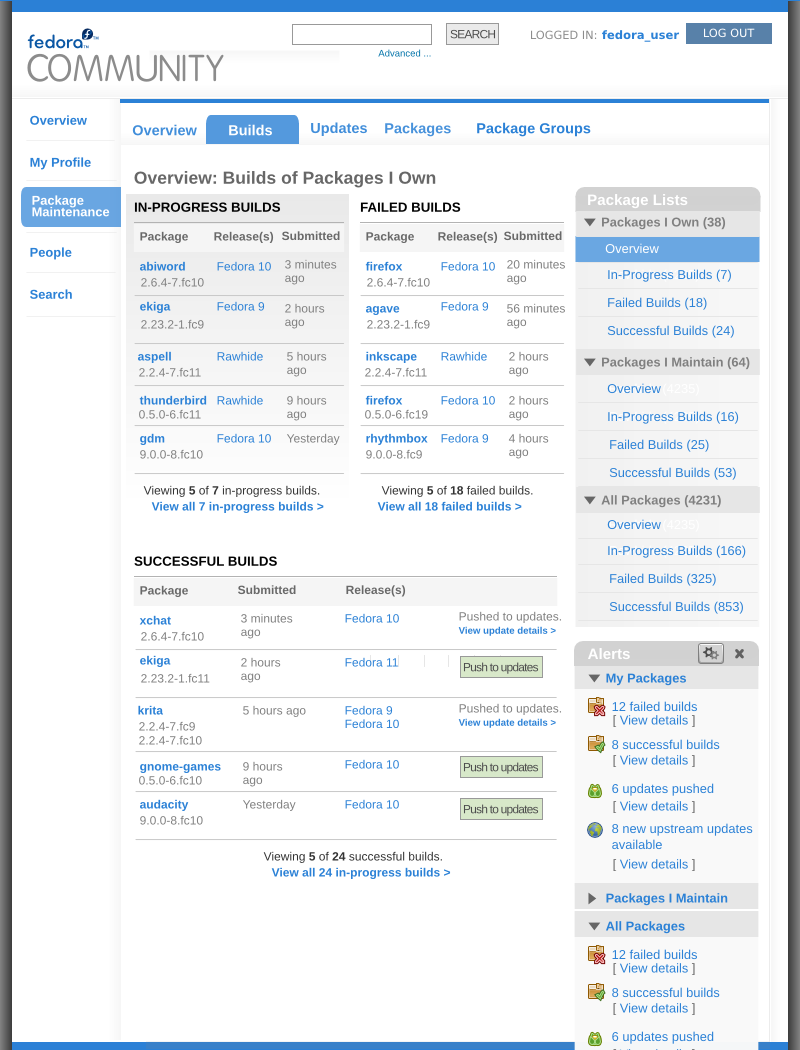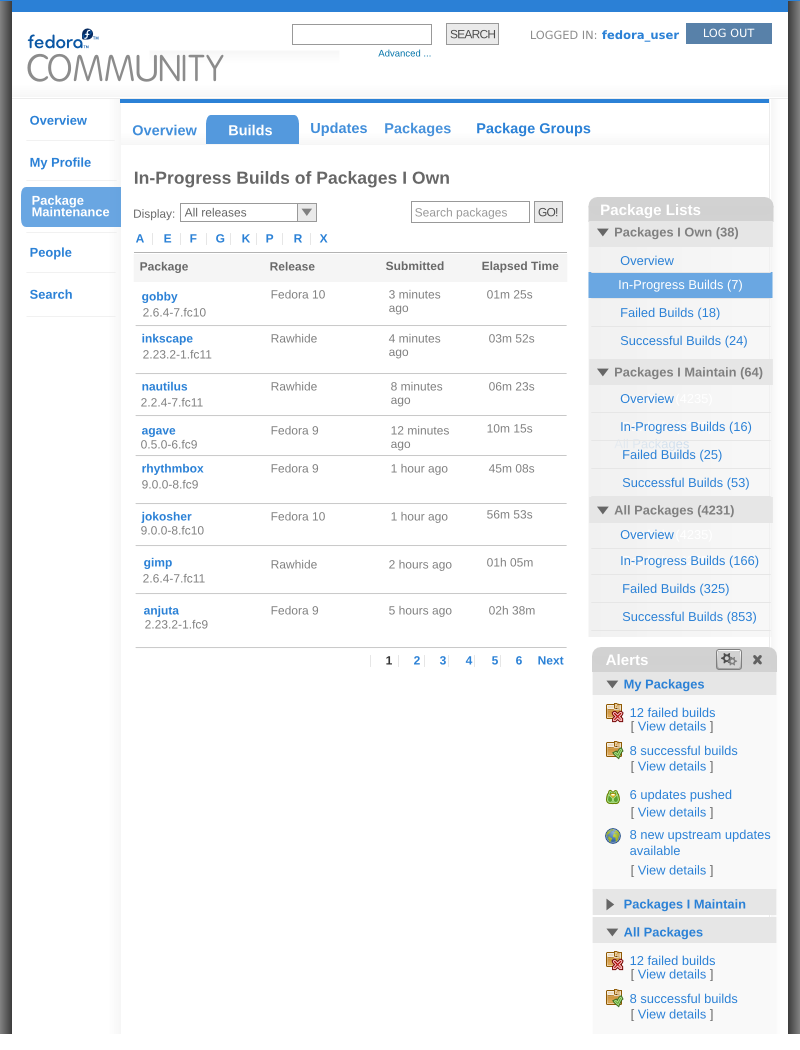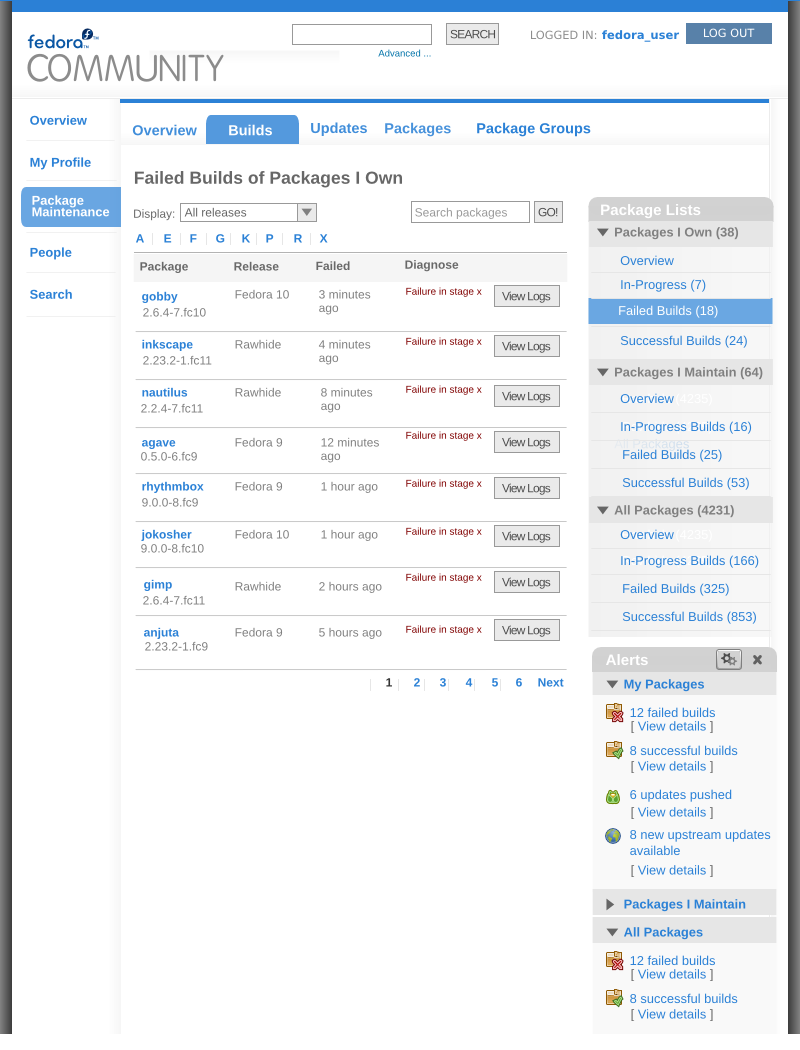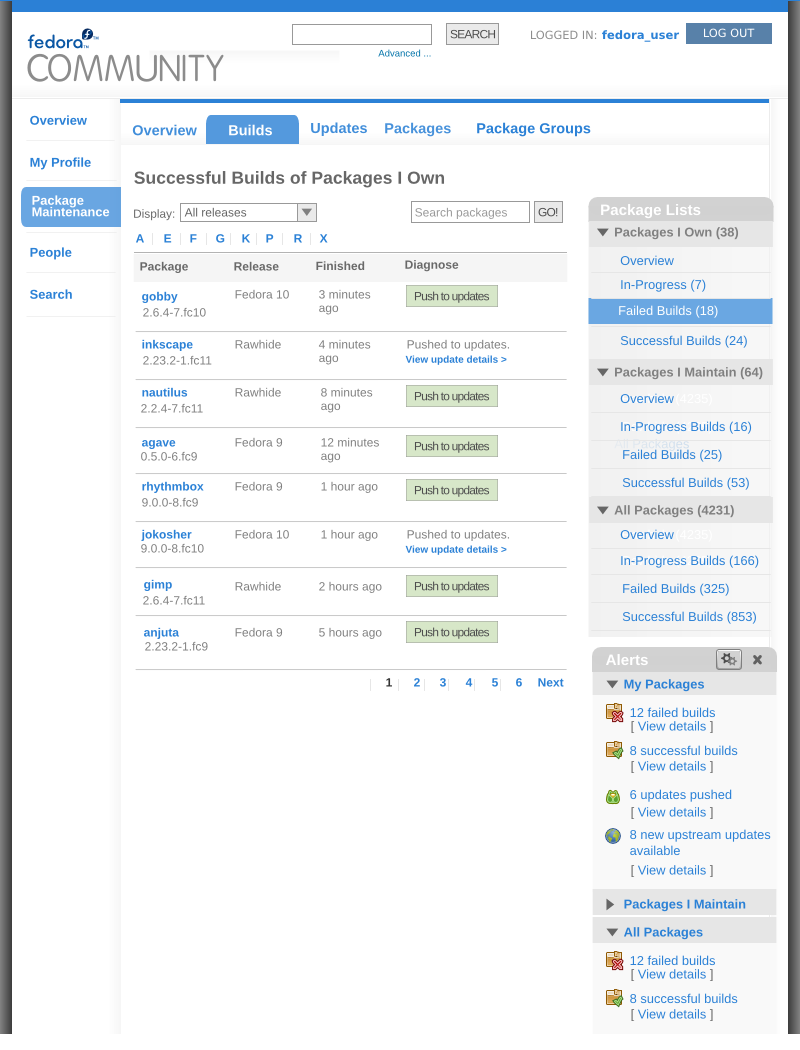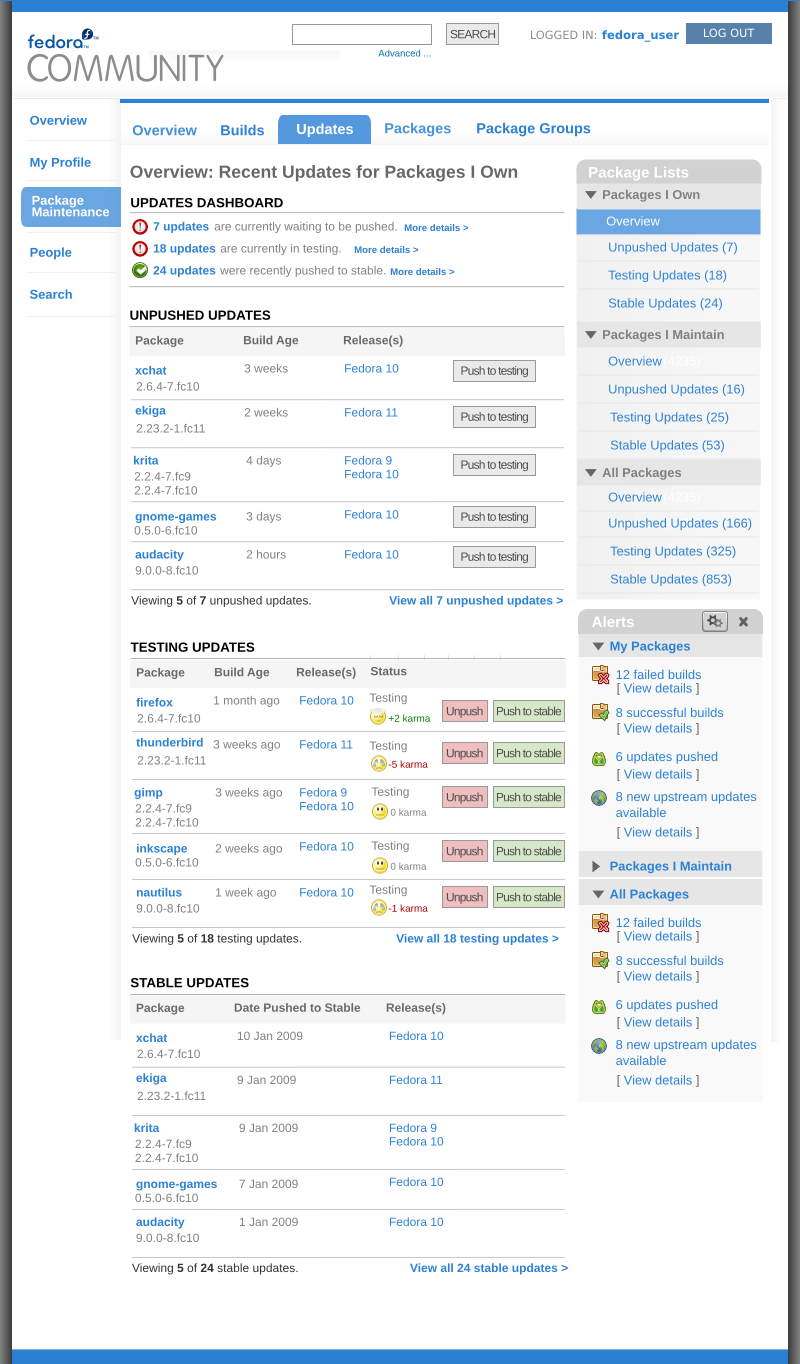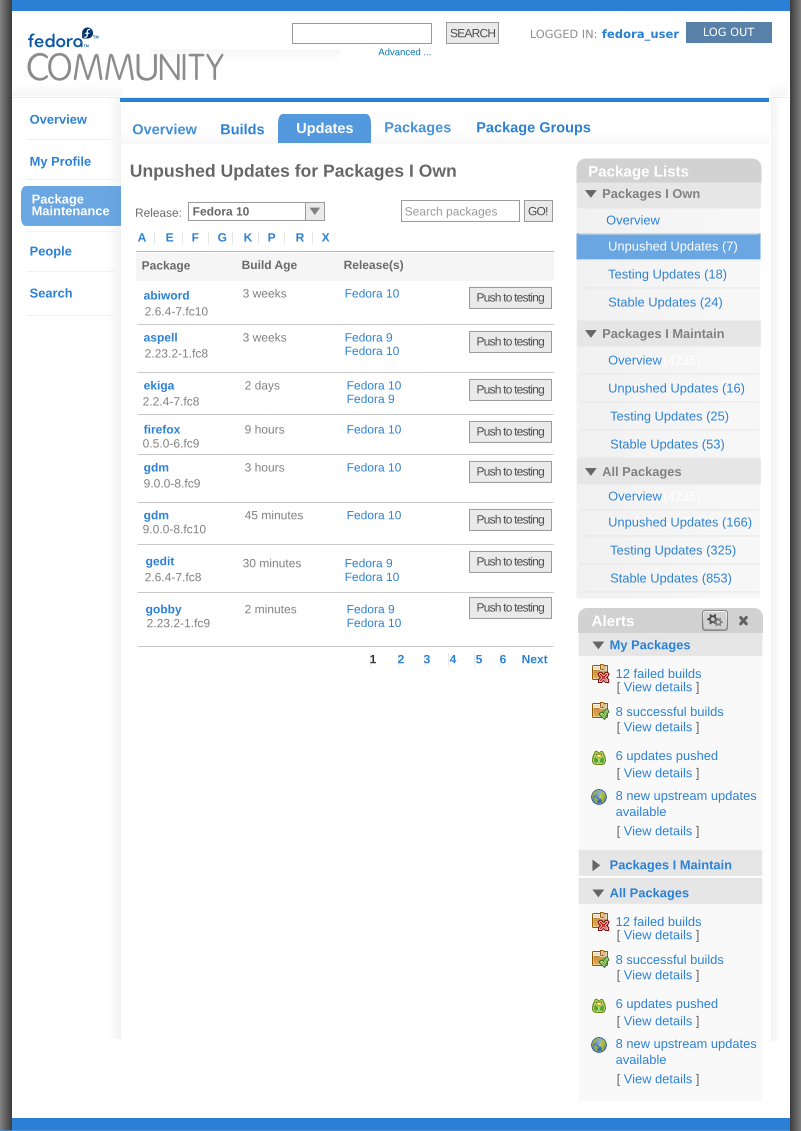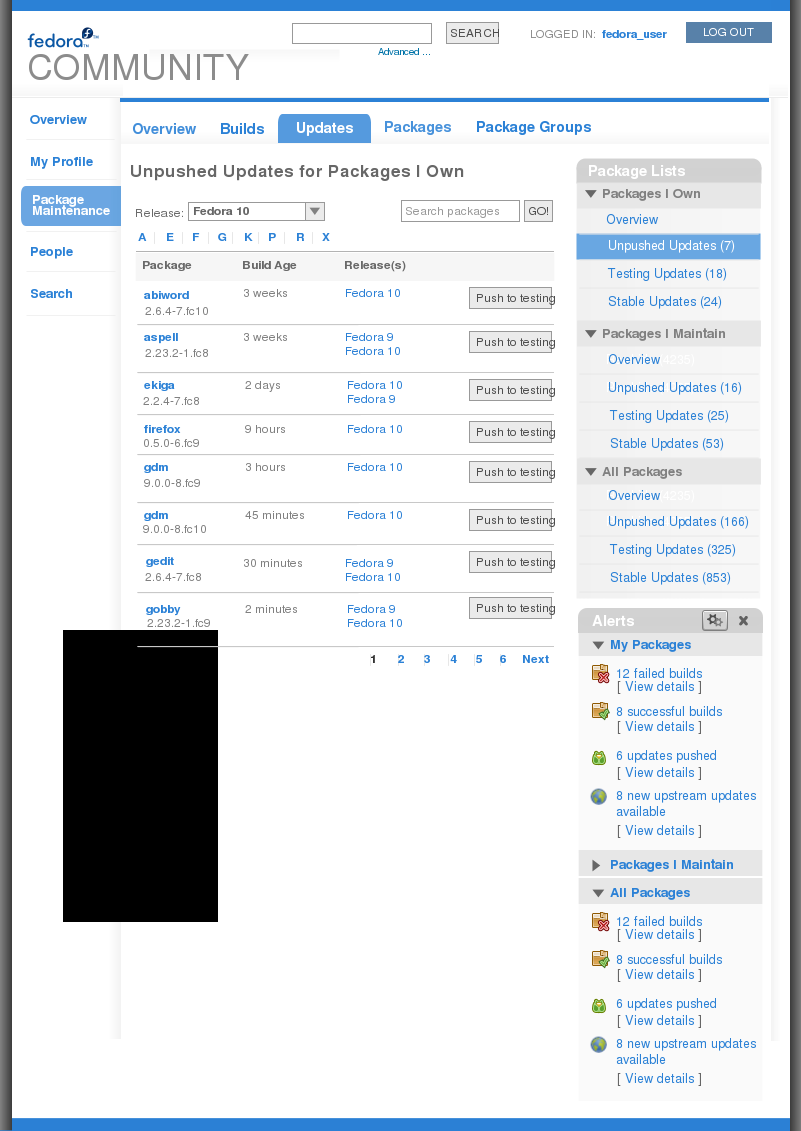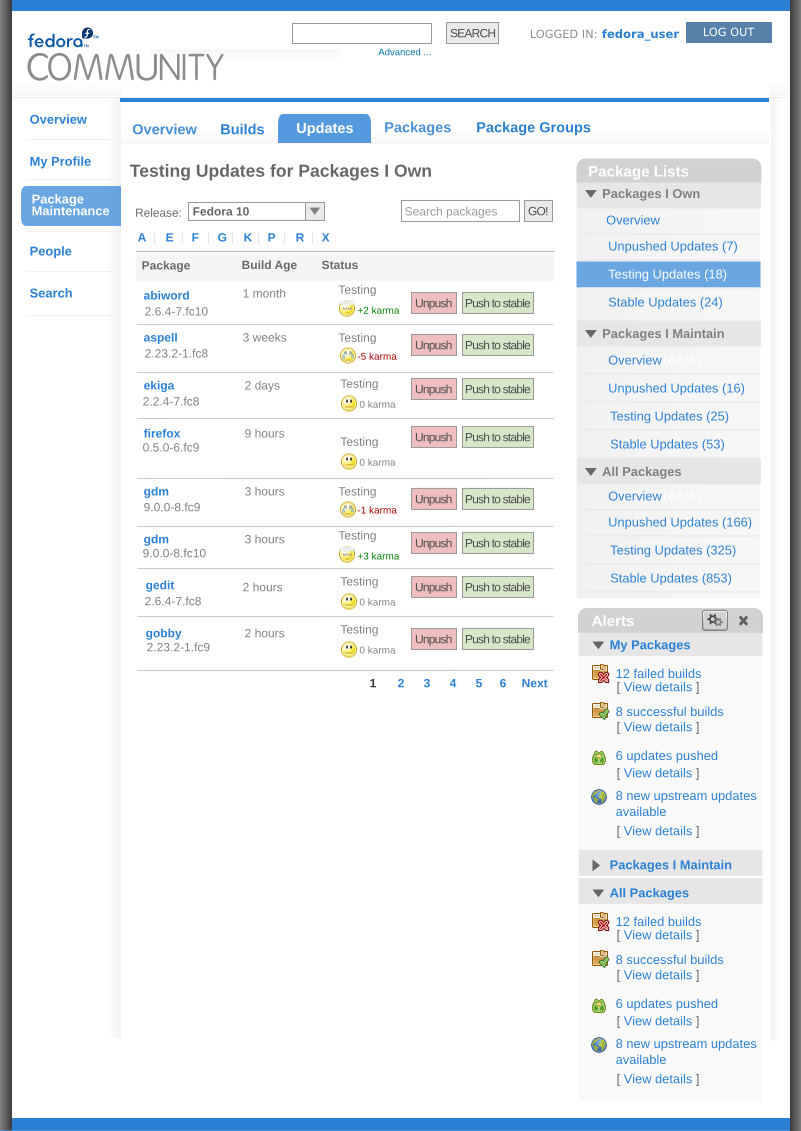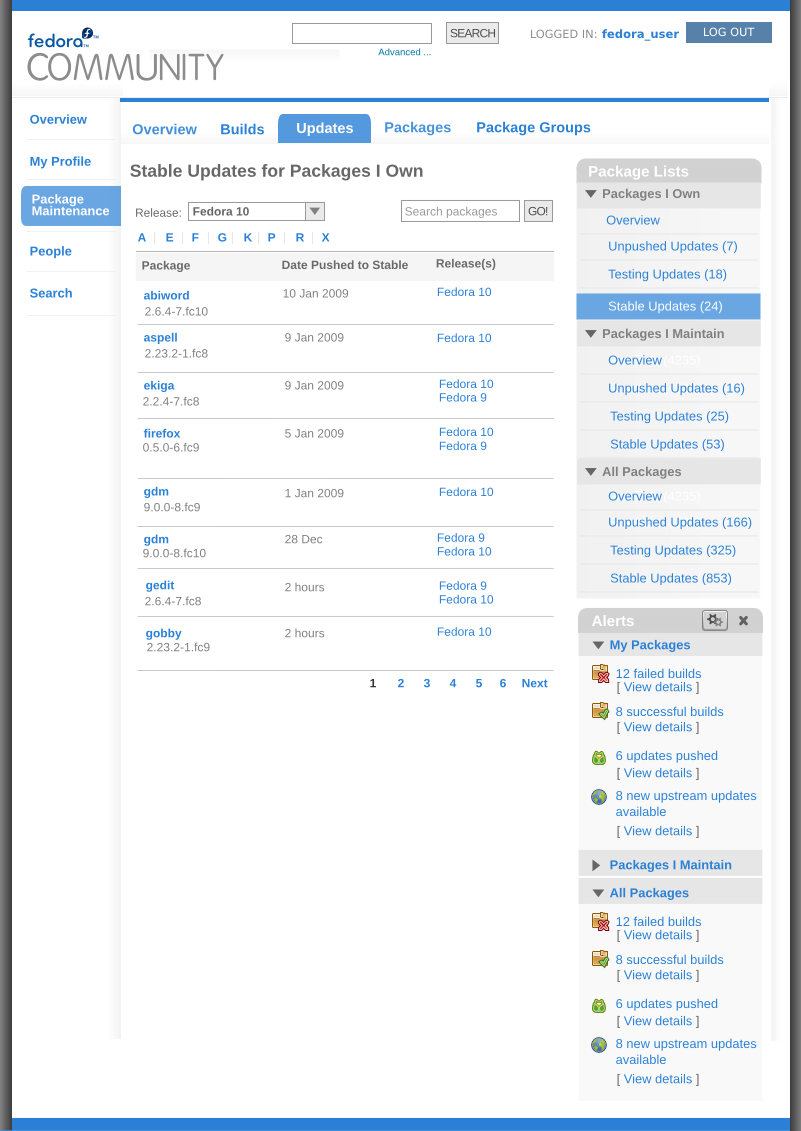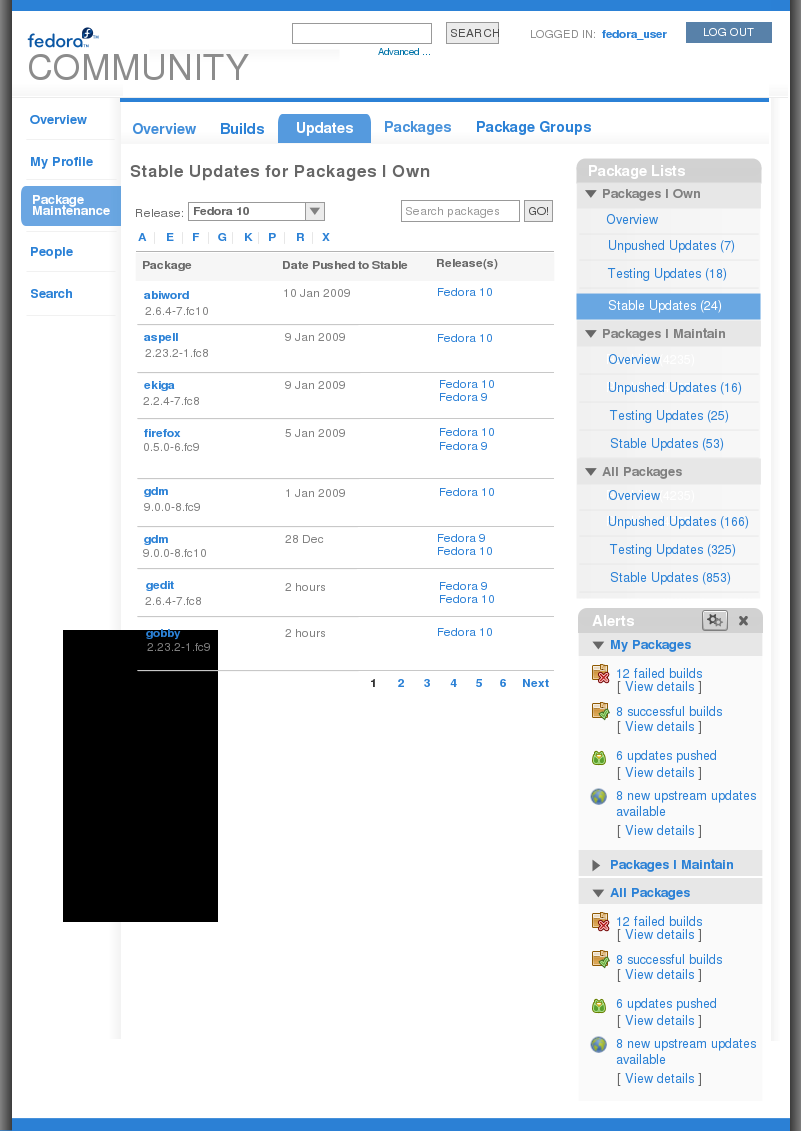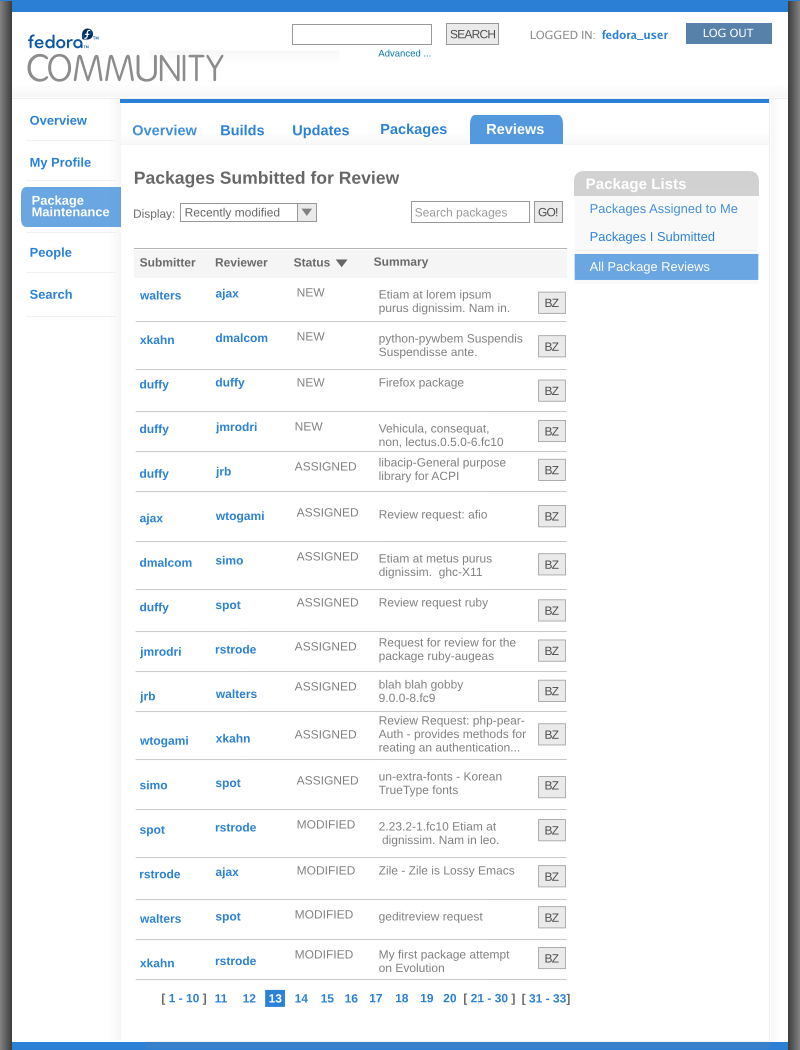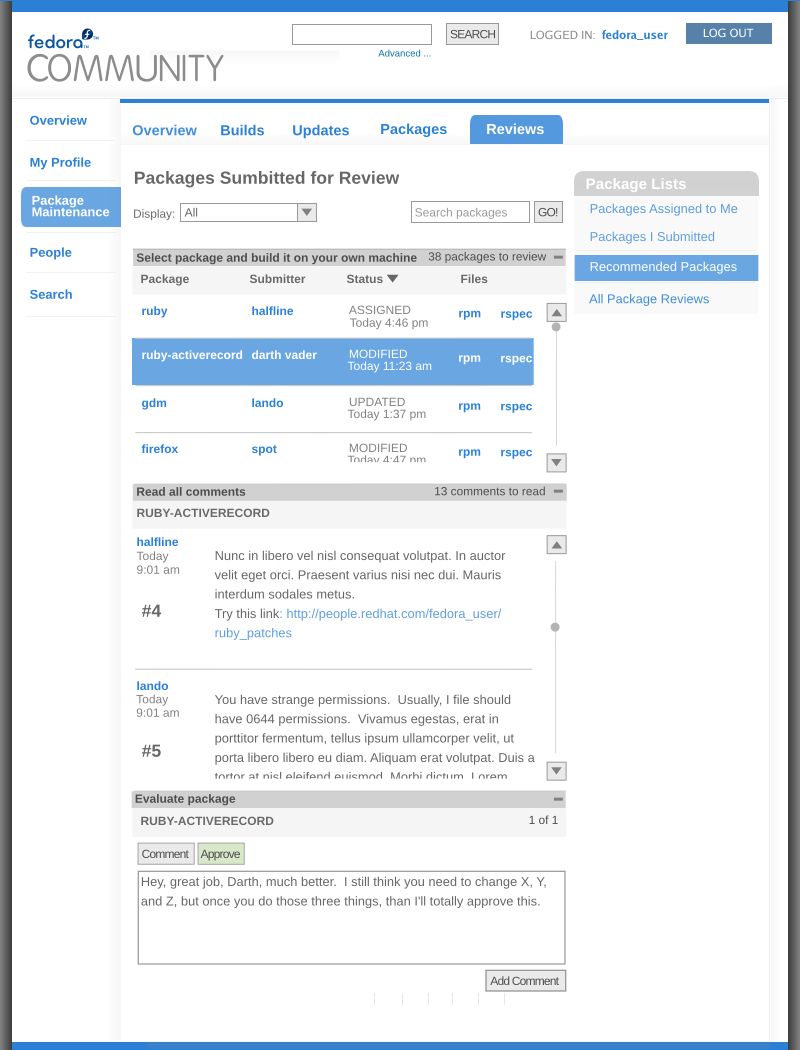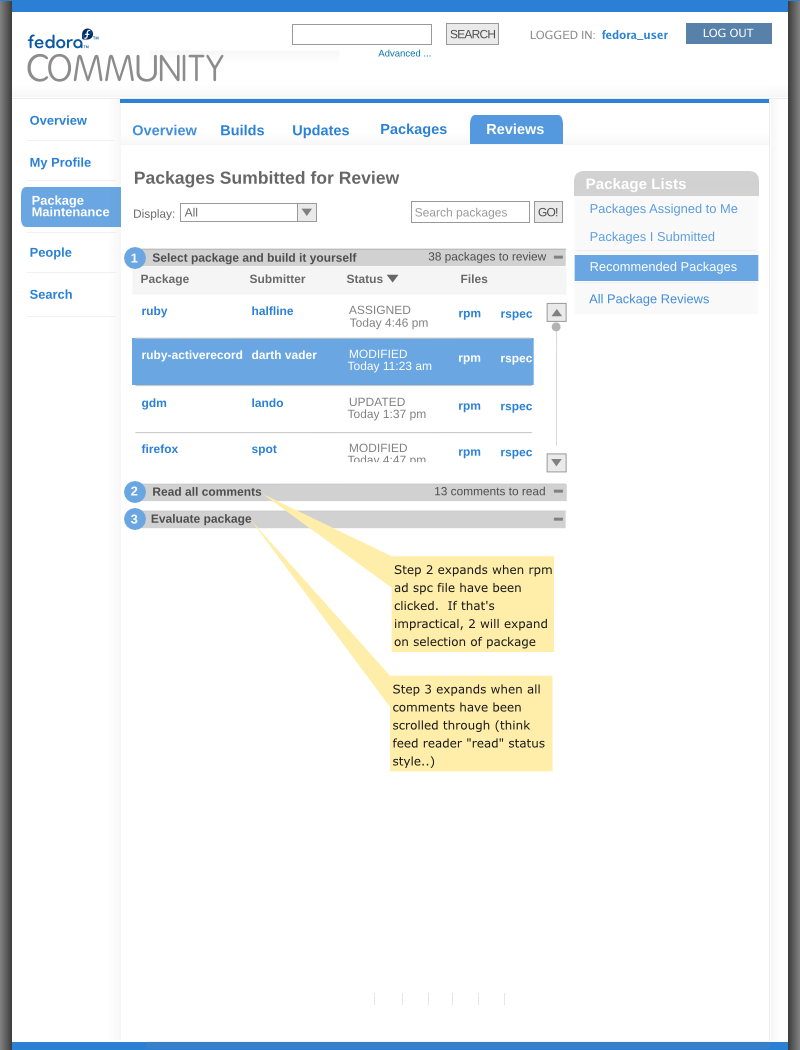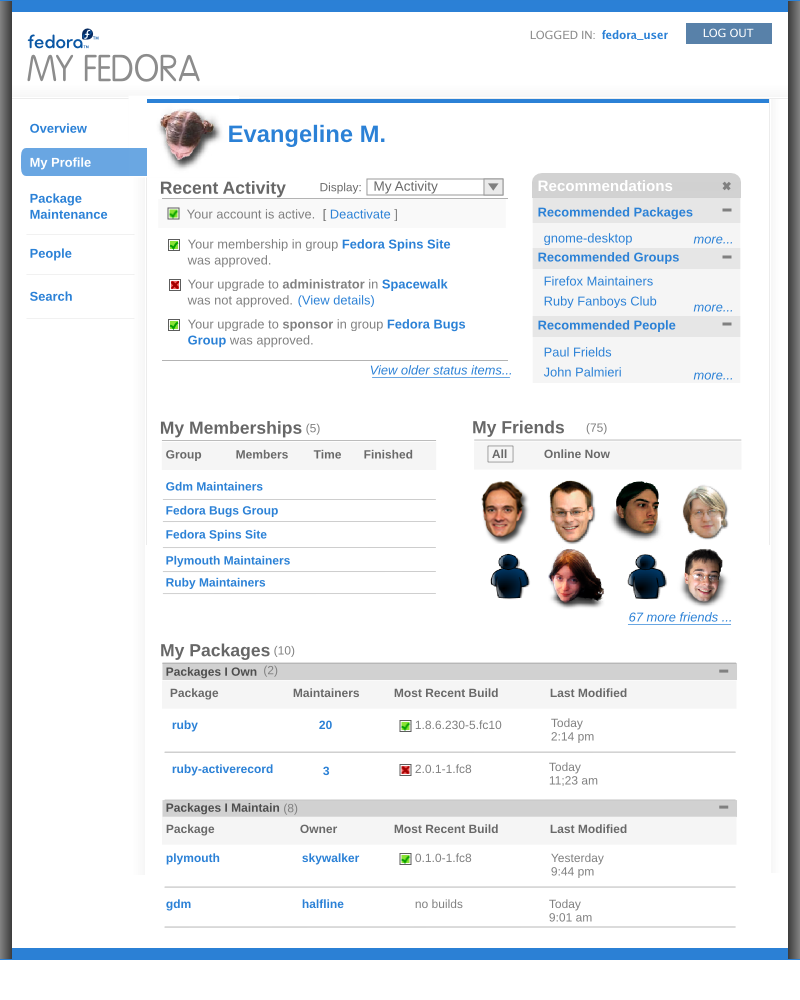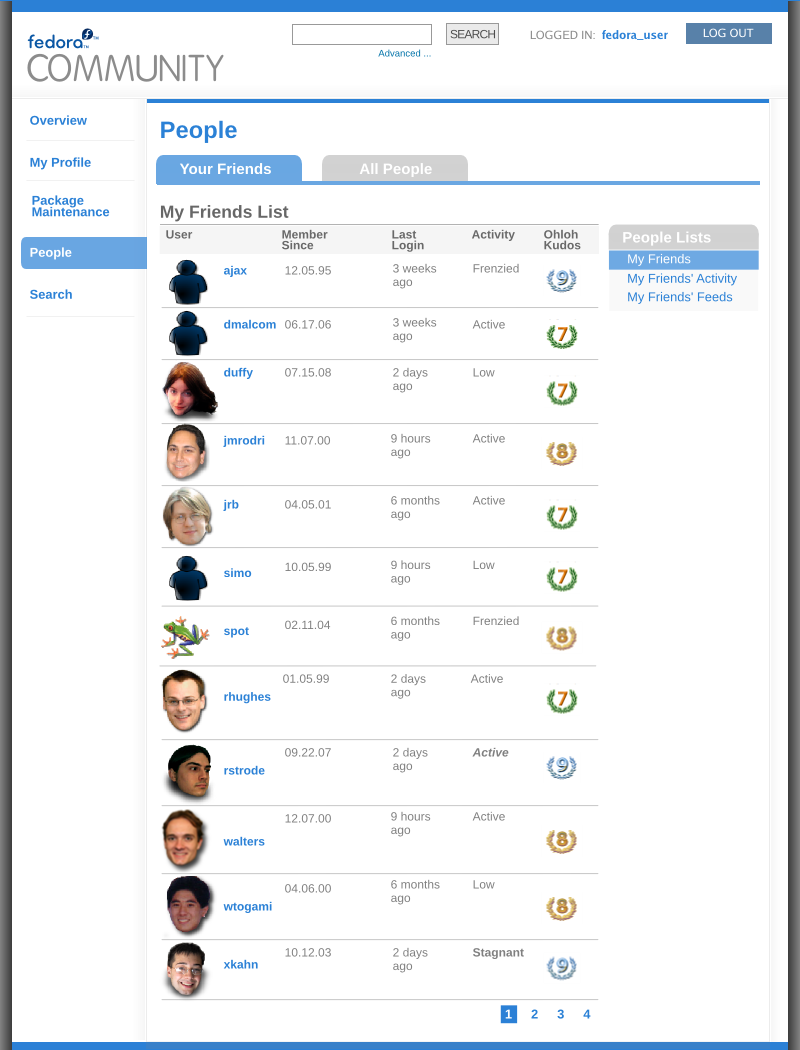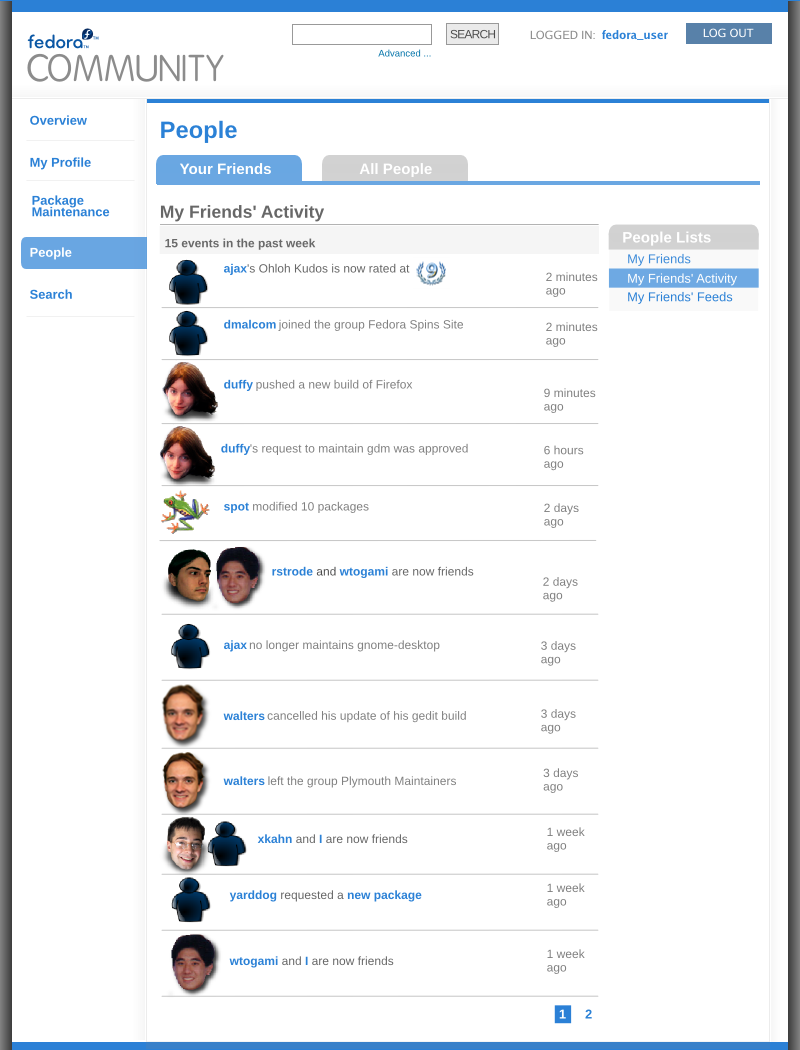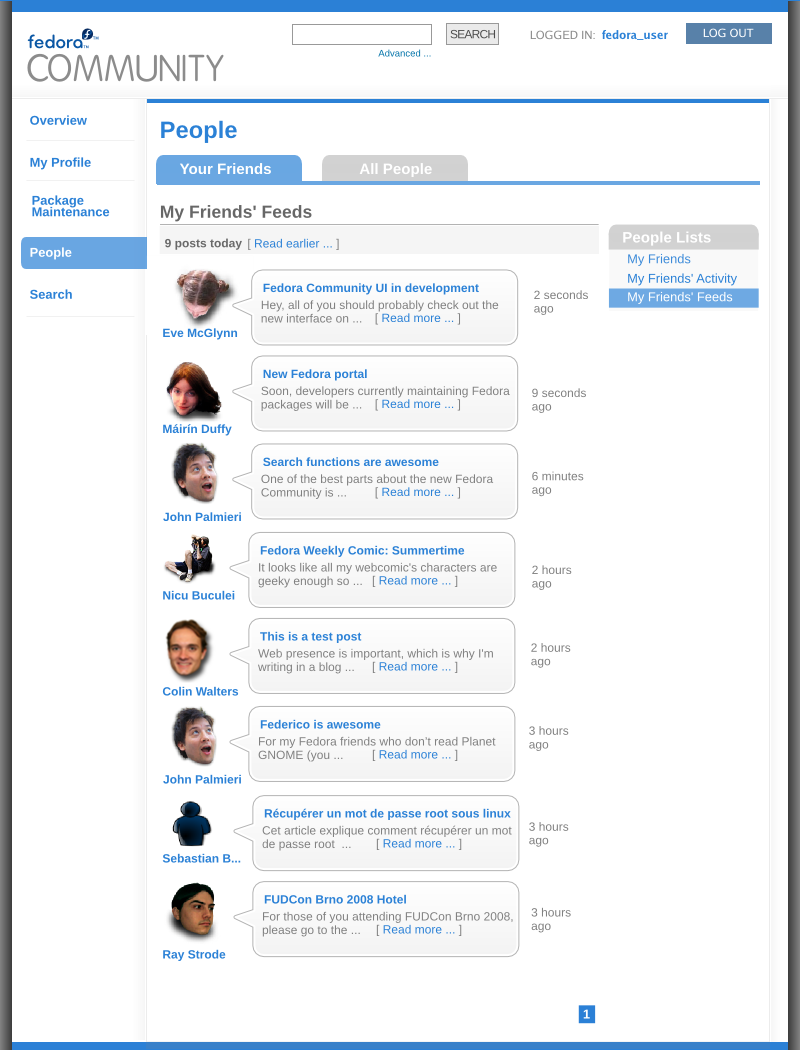| Line 94: | Line 94: | ||
[[:Image:myfedora_otherpersonprofile_updates-overview.svg | Download Source]] | [[:Image:myfedora_otherpersonprofile_updates-overview.svg | Download Source]] | ||
===== Person Profile / Package Maintenance > Updates > Unpushed (*New! 27 Jan) ===== | |||
[[Image:myfedora_otherpersonprofile_updates-unpushed.png]] | |||
[[:Image:myfedora_otherpersonprofile_updates-unpushed.svg | Download Source]] | |||
== Package Details == | == Package Details == | ||
Revision as of 22:47, 27 January 2009
Sitemaps
People / Search
Packages
Mockups
Misc
Landing Page (*New! 26 Jan)
Overview Screen (*New! 26 Jan)
Search Results Screen
People Details
Info/Memberships
Person Profile Overview / Info Tab (*New! 26 Jan)
Person Profile Overview / Memberships Tab (*New! 27 Jan)
Person Profile > Package Maintenance
Person Profile Packages
Person Profile / Package Maintenance > Owned Packages Tab (*New! 27 Jan)
Person Profile Builds
Person Profile / Package Maintenance > Builds > Overview Tab (*New! 27 Jan)
Person Profile / Package Maintenance > Builds > In-Progress Tab (*New! 27 Jan)
Person Profile / Package Maintenance > Builds > Failed Tab (*New! 27 Jan)
Person Profile / Package Maintenance > Builds > Success Tab (*New! 27 Jan)
Person Profile Updates
Person Profile / Package Maintenance > Updates > Overview (*New! 27 Jan)
Person Profile / Package Maintenance > Updates > Unpushed (*New! 27 Jan)
Package Details
NOTES
- Nicolas Mailhot brings up the point that sometimes package maintainers are a named group, not just a list of individuals. He gives the Fonts SIG as an example, I think there is also a gecko group/team that manages those packages. A SIG can maintain an entire grouping of packages (like all of the font packages, all of the gecko packages, etc.). You can see in pkgdb that abyssinica-fonts, for example, is owned by the user 'fonts-sig': https://admin.fedoraproject.org/pkgdb/packages/name/abyssinica-fonts
- Nicolas also brings up the point that sometimes a package can be part of different spins, in some instances a star feature of a spin. The package details pages should call out which spins that package is a part of.
- Nicolas also suggests that packagers and non-packagers might want to put some arbitrary/freeform info in about packages. For example, for the google droid fonts package, a packager might want to make sure there is a link ot the http://fedoraproject.org/wiki/Google_Droid_fonts wiki page since it has a lot of details about that package.
- Nicolas also suggests a queue where people can enter in their wishlist for software to be packaged, maybe other users can vote on it, and non-packagers can fill out the form fields (description, link, license, etc etc) for the package so the packagers don't have to fill out all that stuff.
- Nicolas mentioned that Richard Hughes is looking at adding image previews to package kit descriptions, and wonders if there is a way we could access these image previews and display them within the package details screens for a package.
- TODO: Nicolas recommends not using red and green tints as bad/good indicators for i18n purposes. We should play with shades of grey and blue as an alternative!
Package Details Overview
File:Myfedora-packagedetails-mock1.svg
Package Details > Builds (*New! 20 Jan)
Is the "Built By" column really that important? I feel like maybe I should pull it out. --Duffy 22:30, 21 January 2009 (UTC)
Package Details > Changelogs (*New! 21 Jan)
Package Details > Updates (*New! 21 Jan)
TODO: add bug type/severity: security (severity?), bug, enhancement
Package Details > Bugs (*New! 22 Jan)
NOTE: updated on 23 Jan, based on suggestions below. Still thinking about adding a statistical summary and maybe a pie chart. Also need to explore X.org/kernel special cases. Maybe add a search for all nautilus bugs too in the dashboard?
Notes on bug displays from #fedora-devel:
- Toshio has 36 open bugs right now. He cares mostly about how many open bugs, and how many closed bugs across all of his packages, but he doesn't own many packages. Finer-grained bug states don't typically matter much to him.
- The X.org and kernel use cases for this page should be explored. Both have triaging and use fine-grained bug states.
- James Antill would like to see a list of bugs he looked at / viewed most recently (he is always logged into BZ) and also a list of bugs *he* most recently modified.
- Toshio mentioned that Launchpad has a piegraph of bug states per project. It might be good to get a feel for how actively a project/package is maintained/fixed/etc. Pie graph example: http://bugs.launchpad.net/trac-bzr
- As a developer, Toshio is most interested in what bugs are open. Closed bugs are more interested for someone looking at from the outside but as the developer closed bugs aren't as interesting.
- From jbowes: <jbowes> mizmo: what would be nice would be like 101 bugs, 30 new. (10 new since your last visit) recently filed bugs is good though
Package Details > Source (*New! 23 Jan)
- This is very rough. I'm not 100% sure what will be useful to display here. It may just need to be a very simple page. Here's my first rought cut :) --Duffy 20:25, 23 January 2009 (UTC)
- Weird idea - have a notification box towards the top to list out the last checkin?
Package Maintenance
Packages
Packages List (per release)
These mockups show how the data will look for the Rawhide release list of packages. It shows:
- package name
- latest version # of that package
- package owner
- committers
- followers
File:Myfedora-packagelist-mock1.svg
Packages List (My Packages)
These mockups show how the data will look for a list of packages owned by a particular person (the logged in person for now). It shows:
- package name
- latest version # of that package in rawhide
- active releases column (if you don't own it for one of those releases, it's greyed out with a hover over explanation)
- committers
- followers
File:Myfedora-packagelist-userpackages-mock1.svg
Obsoleted Packages List (per release)
Obsoleted packages - shows what the package was obsoleted by and what version numbers went out (if any) in the active fedora releases)
File:Myfedora-packagelist-obsoletes-mock1.svg
Builds
Builds Overview List
File:Myfedora-buildslist-mock1 overview.svg
In-Progress Builds List
File:Myfedora-buildslist-mock1 inprogress.svg
Failed Builds List
File:Myfedora-buildslist-mock1 failed.svg
Successful Builds List
File:Myfedora-buildslist-mock1 success.svg
Updates
Updates Overview List
File:Myfedora-updateslist overview-mock1.svg
Unpushed Updates List
Testing Updates List
File:Myfedora-updateslist testing-mock1.svg
Stable Updates List
Reviews
Reviews List
File:Myfedora package review stripped.svg This is the stripped down version of the package review screen, or rather, what could be reasonably accomplished without a massive overhaul of the back end. More elaborate version below.
File:Myfedora package2.svg More of a forced sequence model.
Users
Profile Screen
People List
People Activity
File:Myfedora people activity.svg
People Feeds
File:Myfedora people feeds.svg

